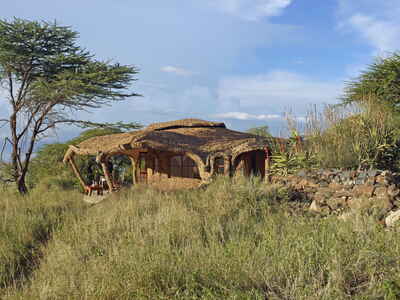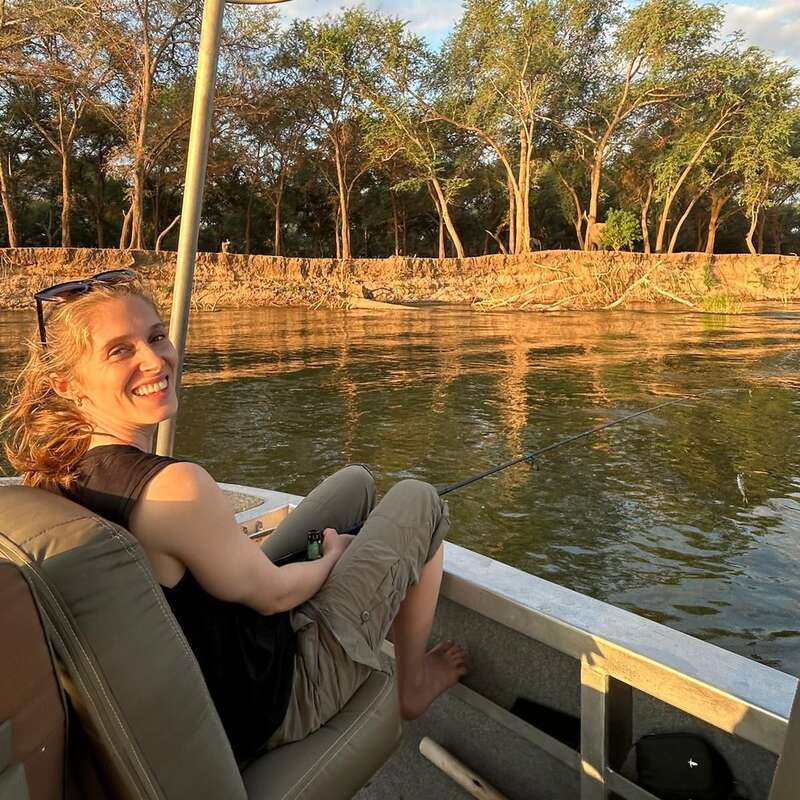About Lewa House
With spectacular views, warm owner-hosting and access to wildlife-rich terrain, Lewa House offers an enriching and personal safari.
Perched on a hilltop in the heart of the Lewa Conservancy, Lewa House is an elegant family-run retreat where conservation and hospitality go hand in hand. Sophie and Calum McFarlane welcome guests into their home with genuine warmth, offering thoughtful experiences that connect you to the land, its wildlife, and its people.
Earthpod cottages, beautifully crafted with curved stone walls, hand-built furniture, and sky-lit interiors, blend seamlessly into the landscape. Each opens to wide views of savanna with rolling hills and valleys. Days are spent exploring Lewa’s vibrant conservancy on game drives and walking safaris led by expert guides, with encounters that feel wild yet unhurried.
Beyond the wildlife, guests are invited into the rhythm of farm life - feeding pigs, visiting the biodynamic vegetable garden, and learning about solar and grey water systems. Further afield, forest walks, cultural visits, rhino monitoring, and even helicopter trips add richness to longer stays.
In the evenings, gather under the thatch of the main lodge to share stories over organic, home-cooked meals. At Lewa House, every welcome is heartfelt and the owners’ passion for their piece of paradise shines through.
Our view
We were quite smitten by the natural, organic and homely experience at Lewa House. The accommodation is unique, stylish and very comfortable; the grounds and views are beautiful; the activities diverse; and the hosts charming and fun to be with. The location is superb, with the Lewa Conservancy's many impressive assets easily accessible. It’s a wonderful place to stay a while, whether travelling as a couple, friends or a family.
Accommodation
7 rooms
Children
Good for all ages
Open
Dec-Mar and May-Oct
Activities

4WD Safari

Birdwatching

Cultural excursion

Guided walking safari

Horse-riding

Night drive

Private activities
Traveller reviews of Lewa House
5 real, un-edited reviews from Expert Africa's travellers.
Arrived 8 Aug 2023, 3 nights
"Lewa House review"
Overall rating: Excellent
Arrived 17 Jan 2022, 3 nights
"Lewa House review"
Overall rating: Excellent
Arrived 15 Feb 2020, 4 nights
"Enjoyable 4 nights at Lewa House"
Overall rating: Excellent
Arrived 18 Feb 2019, 5 nights
"Lewa House review"
Overall rating: Excellent
Arrived 15 Dec 2018, 3 nights
"Amazing Lewa House"
Overall rating: Excellent
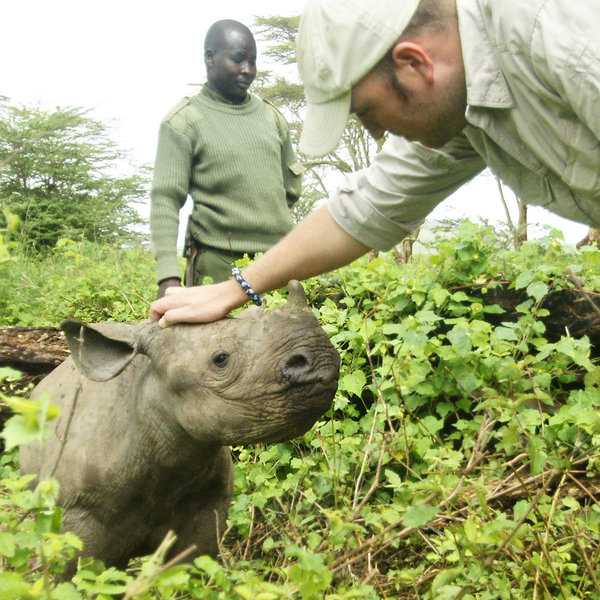
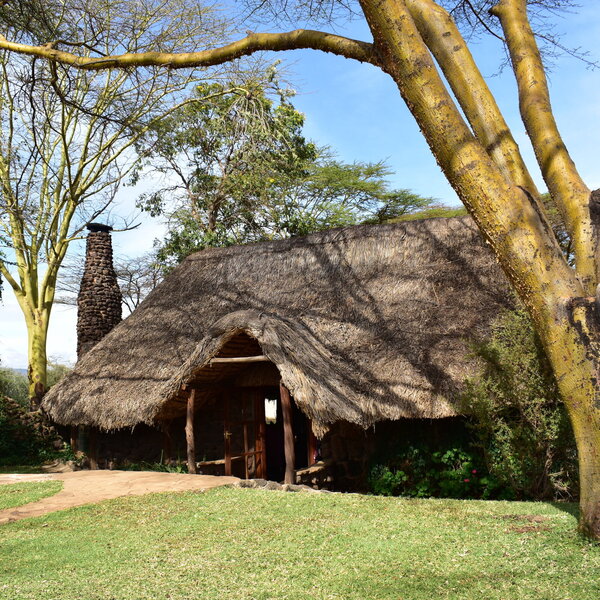
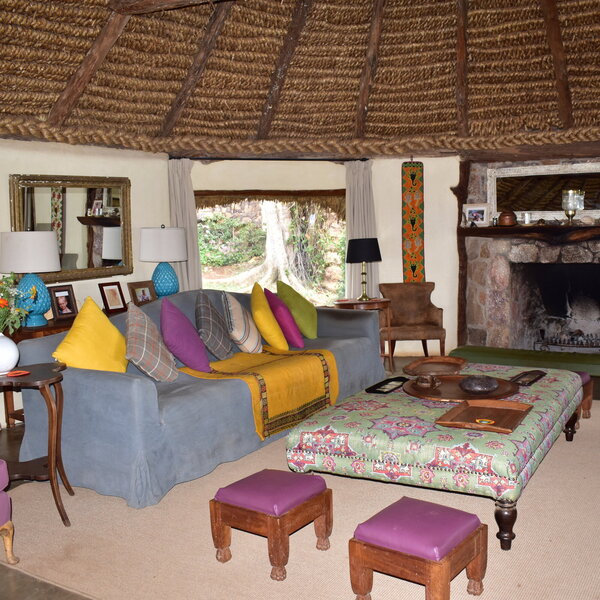
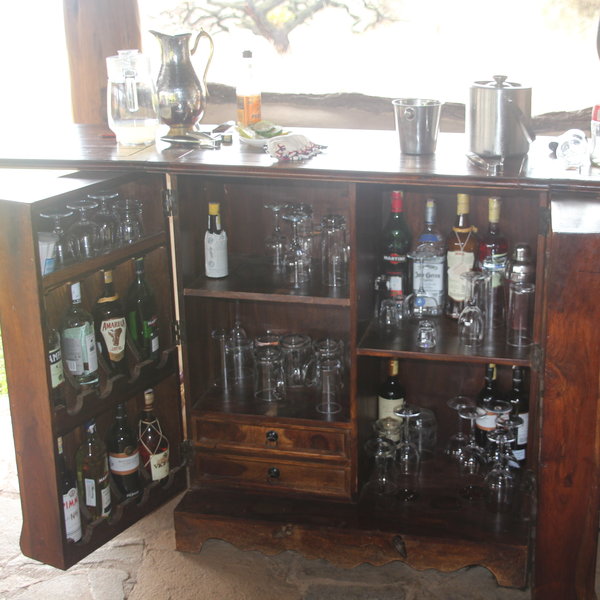
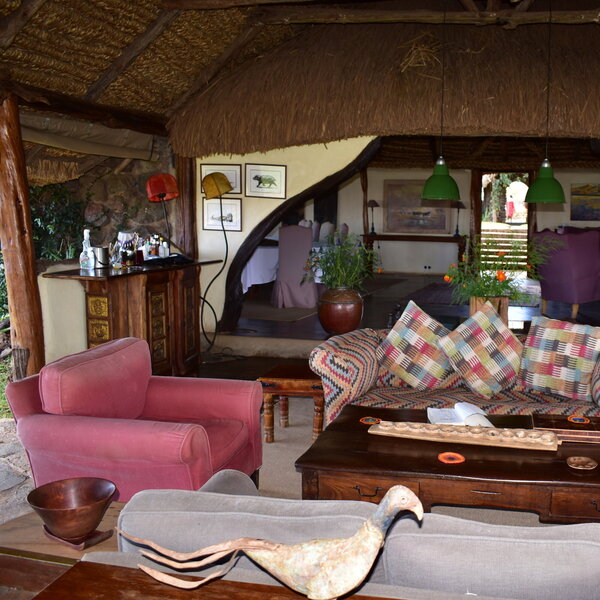
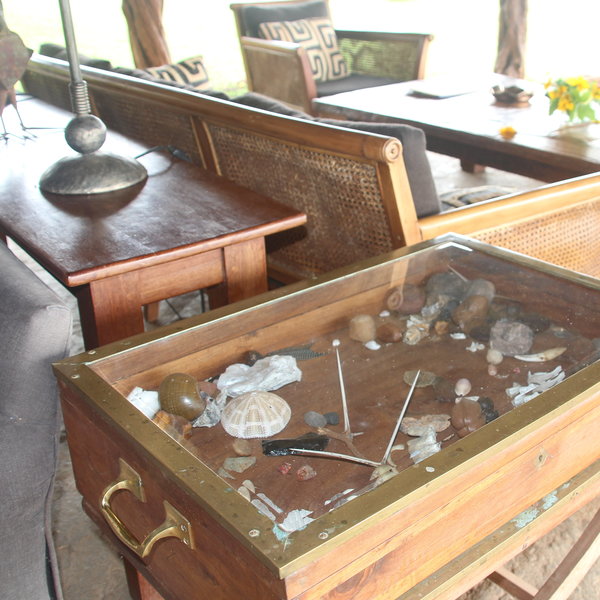
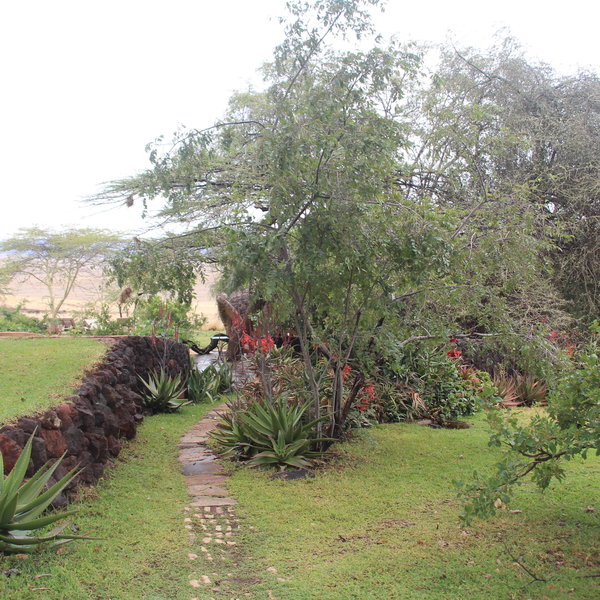
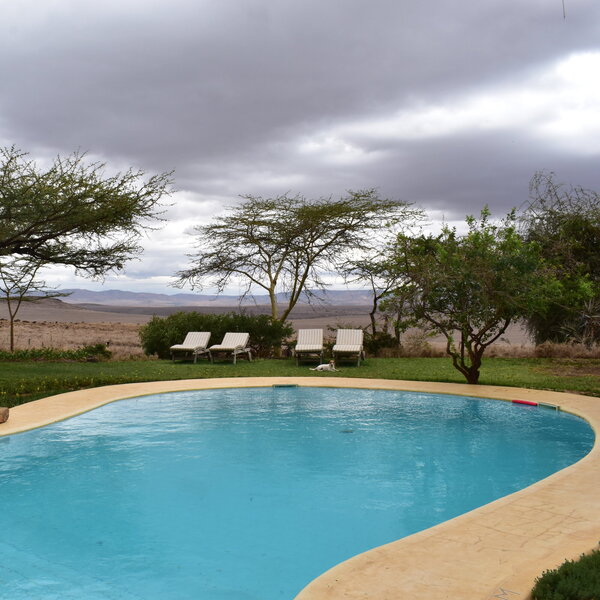

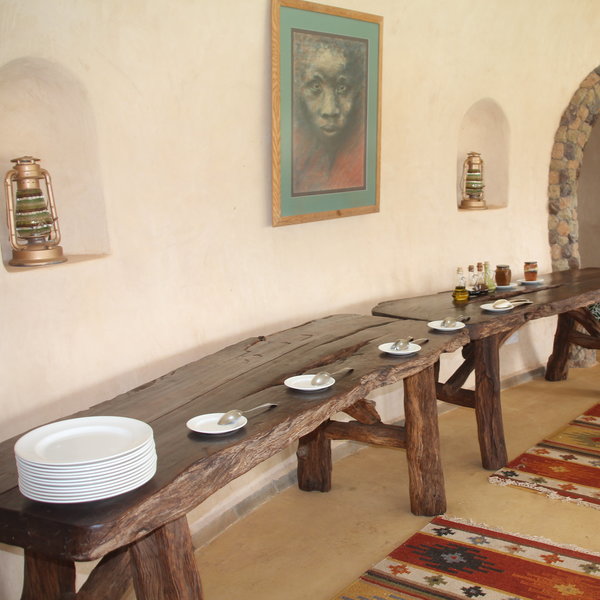
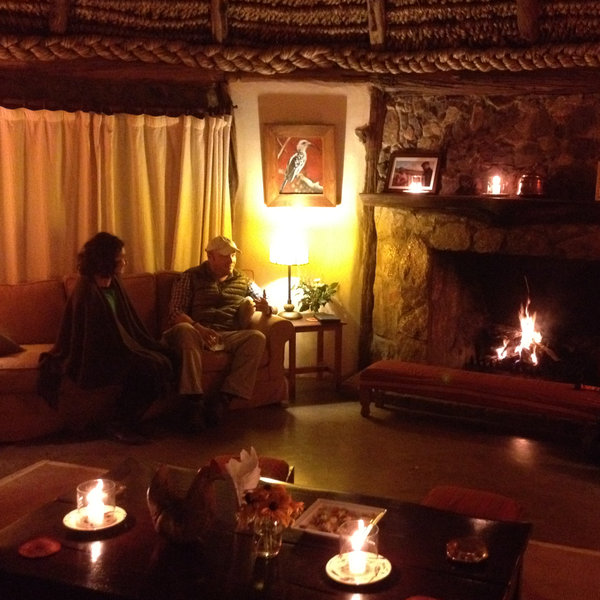
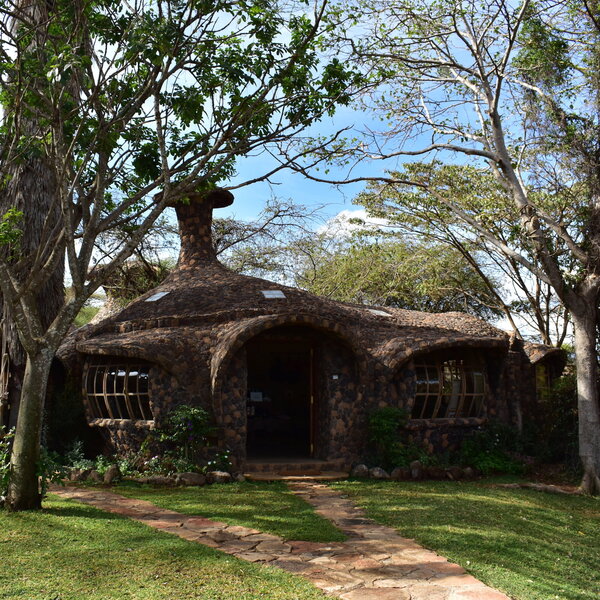
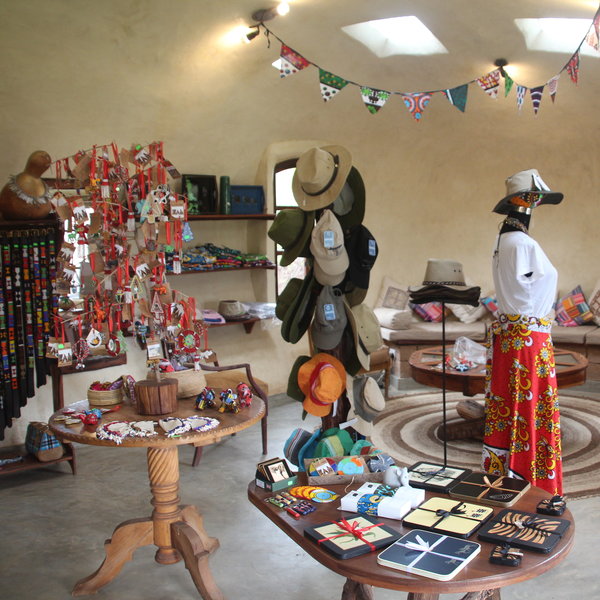
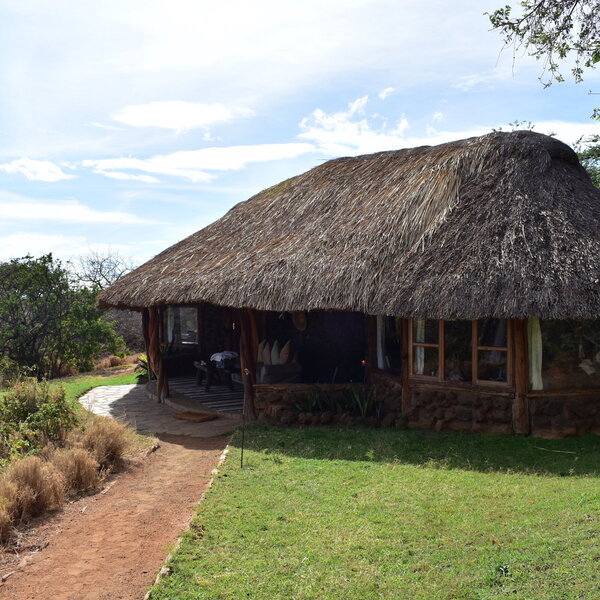
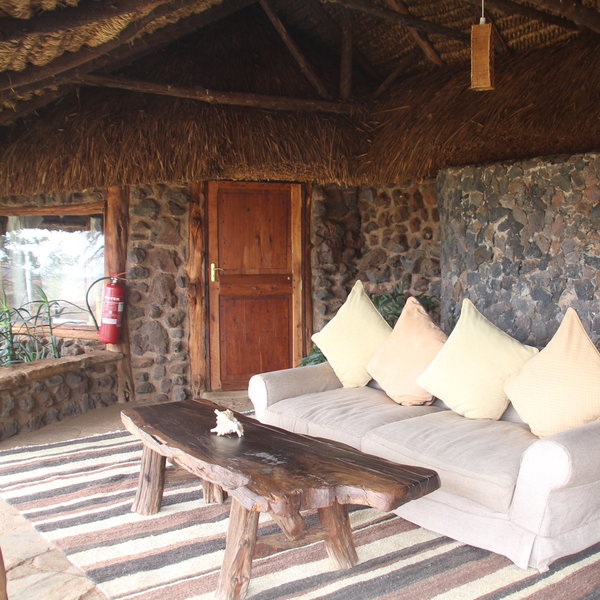
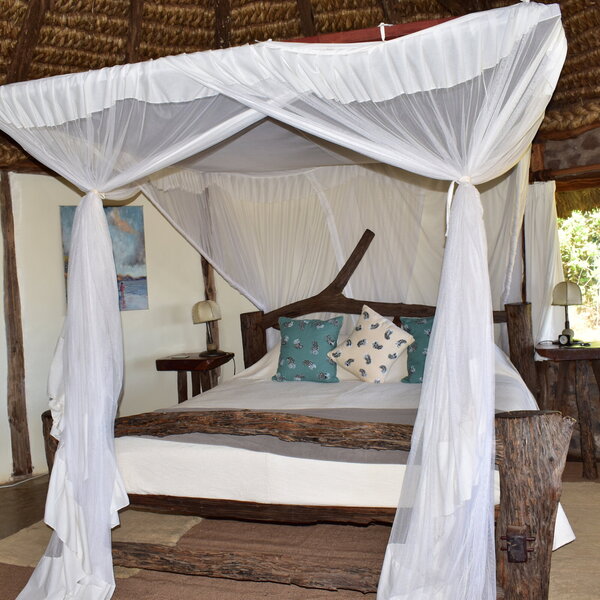
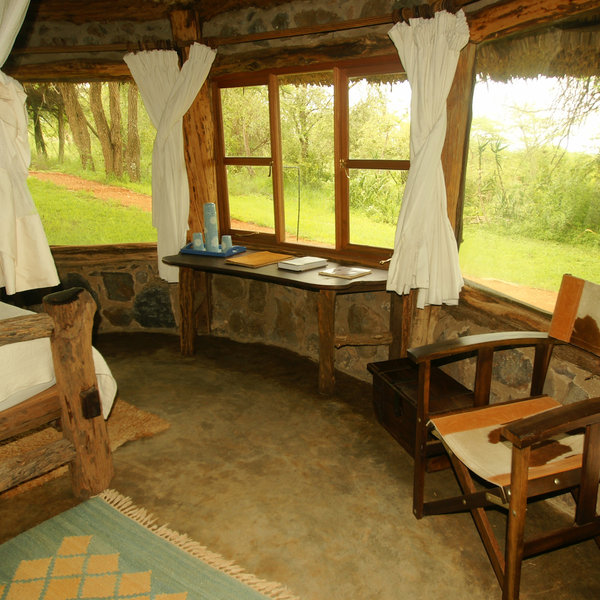
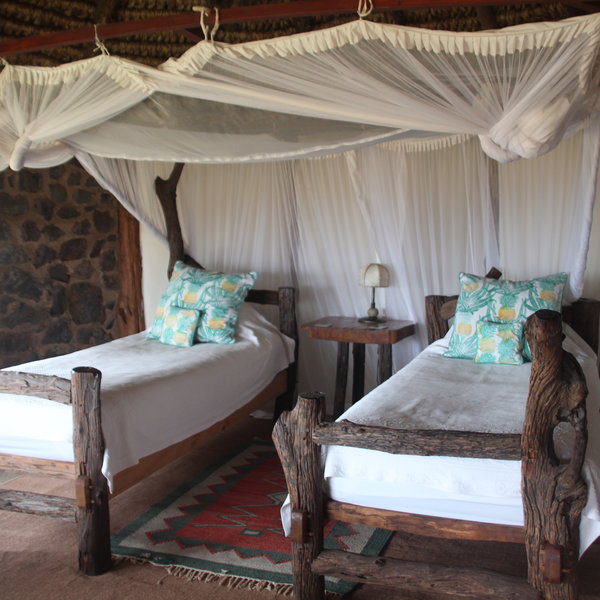
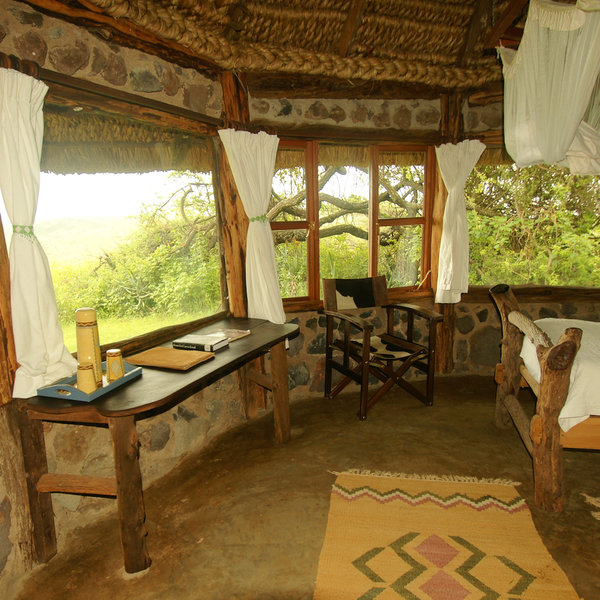
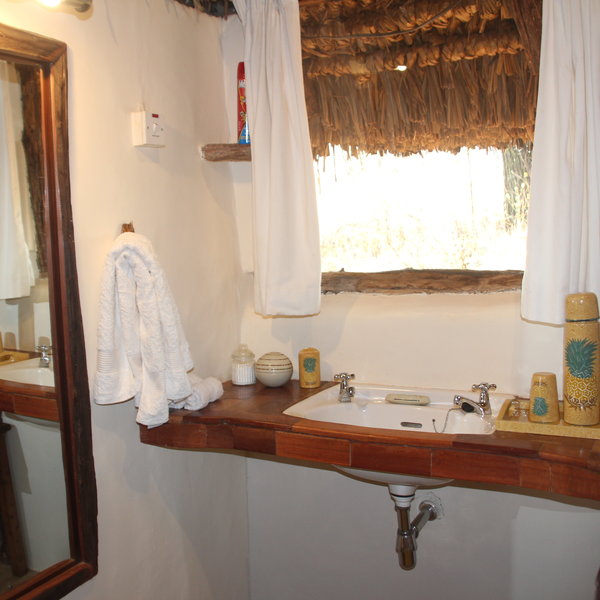
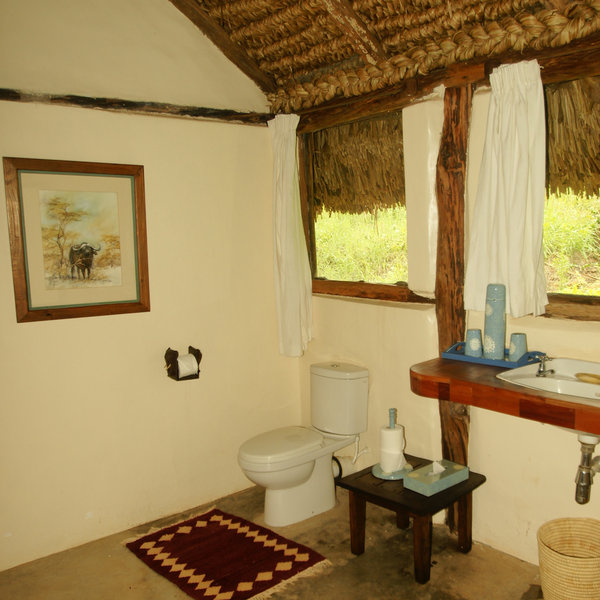
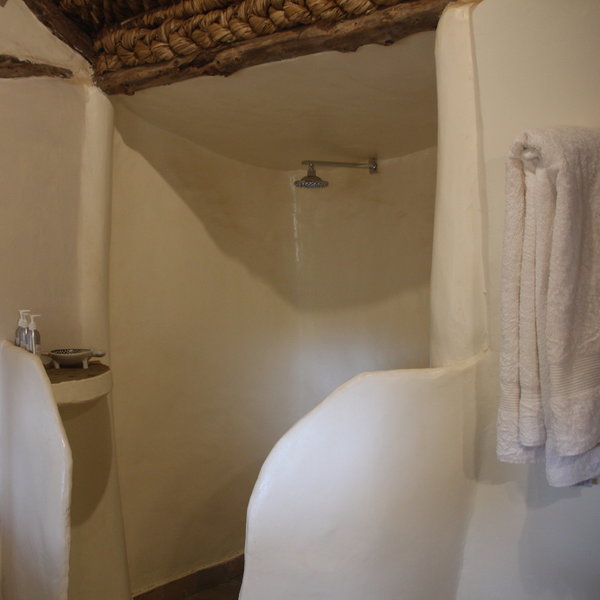
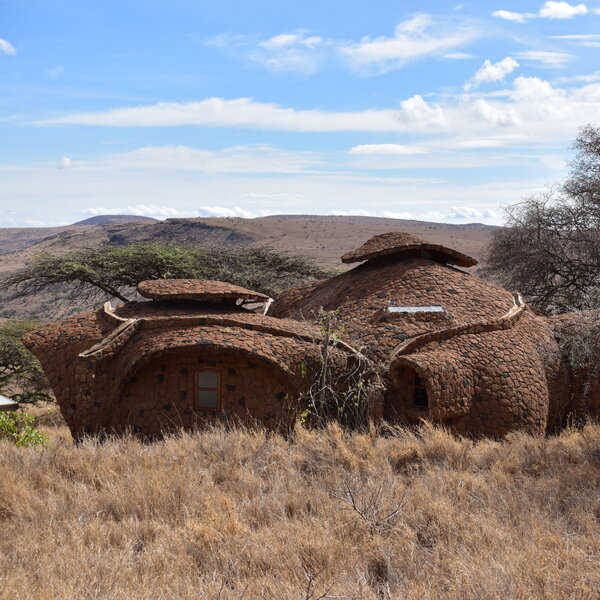
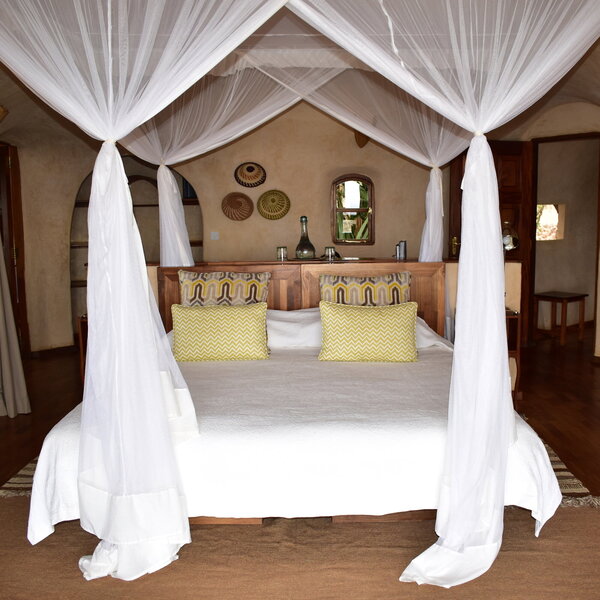
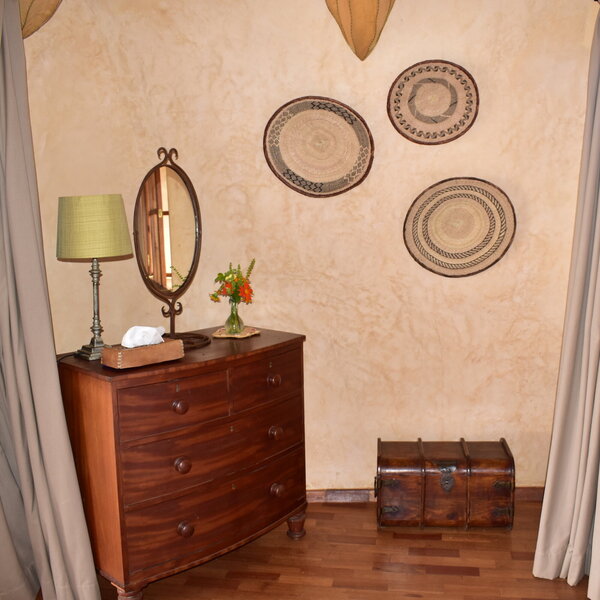
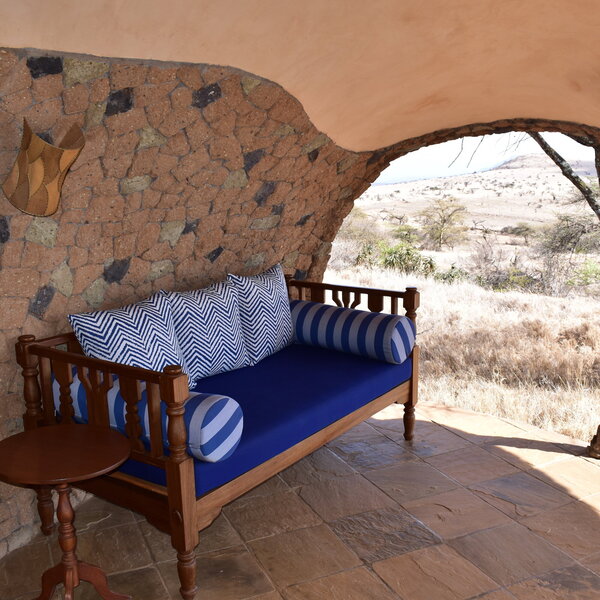
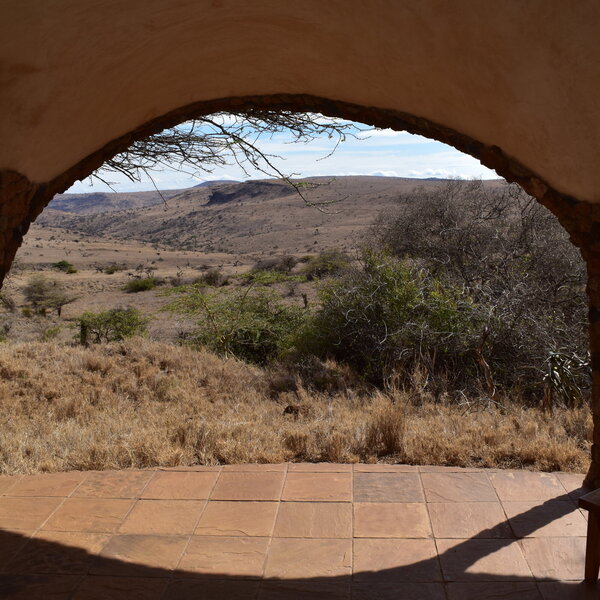
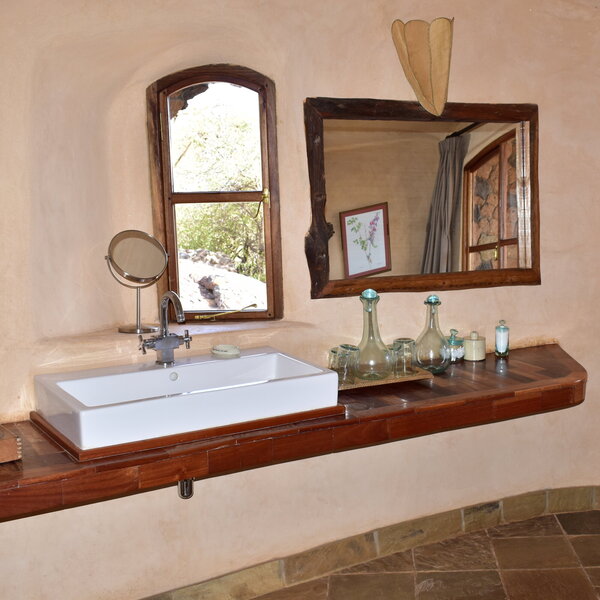
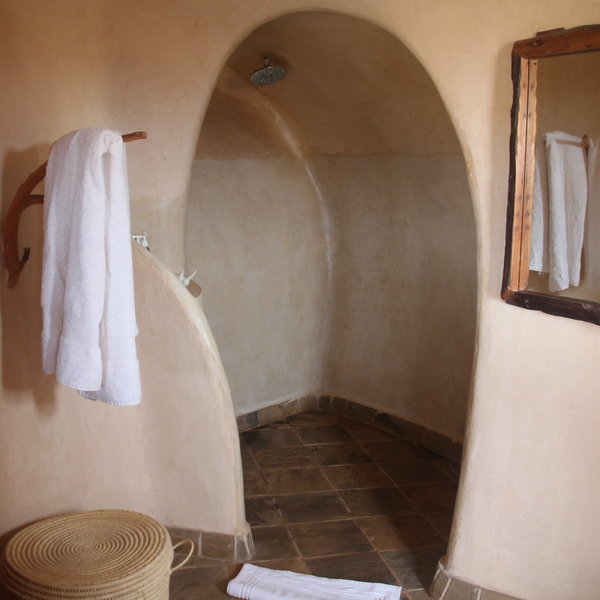
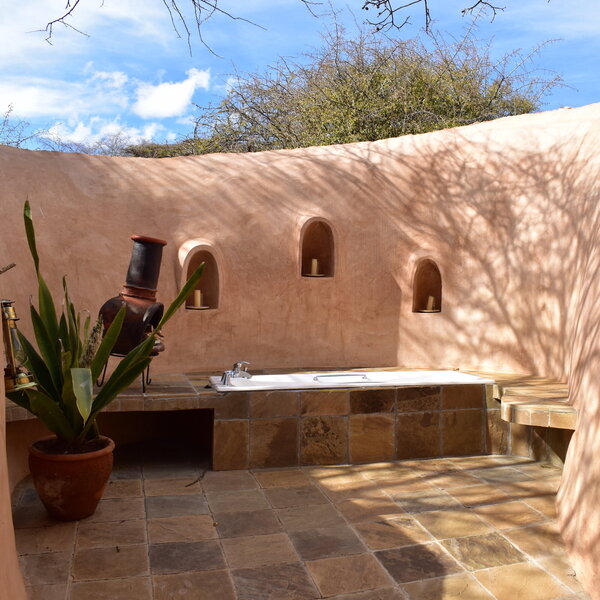
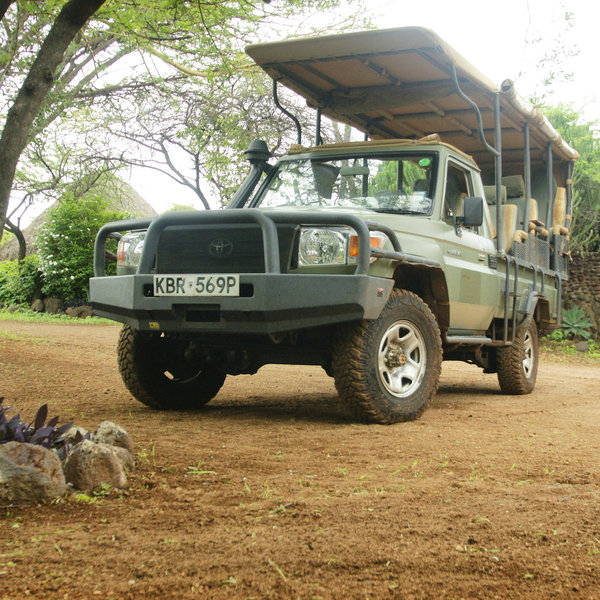
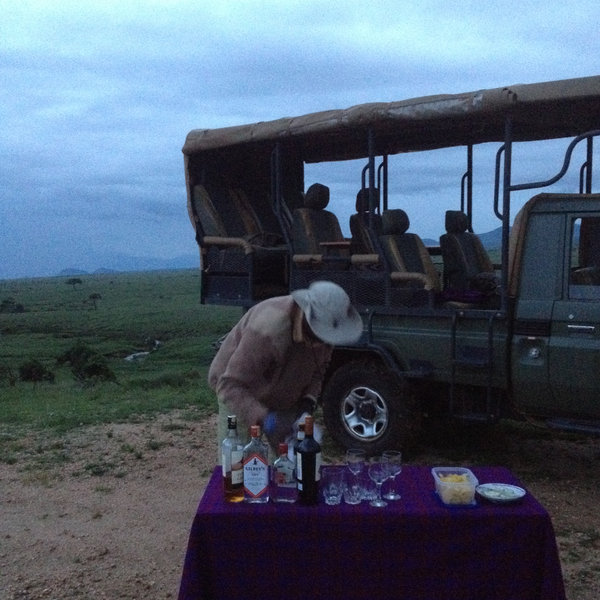
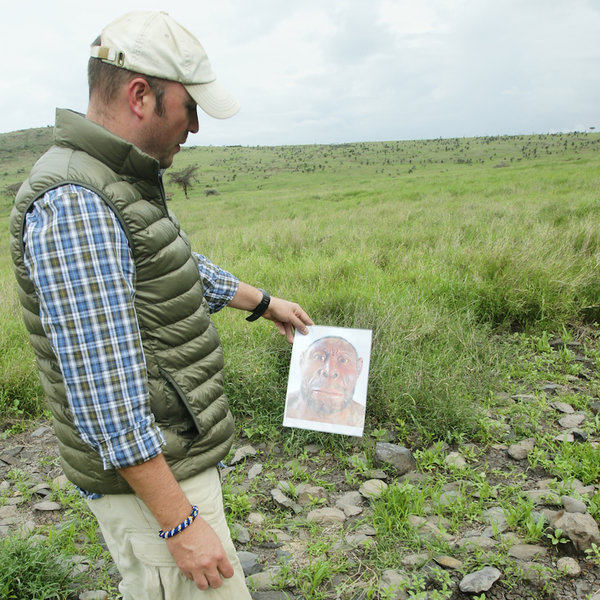
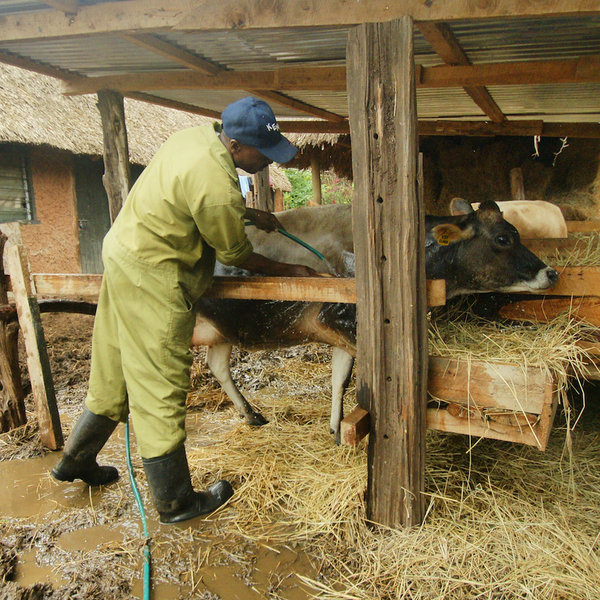
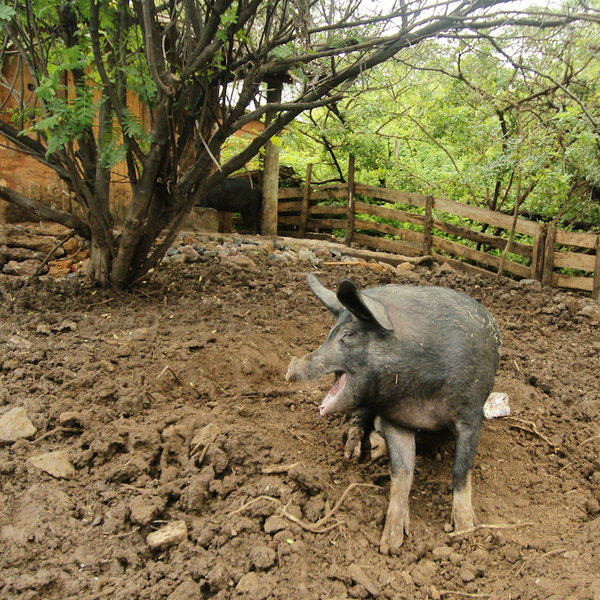
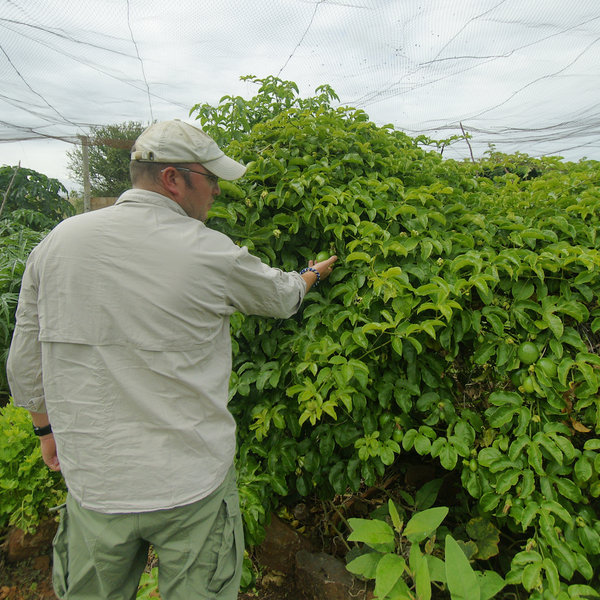
Expert Africa's gallery
When we travel we take lots of photos ourselves to give you a real and un-edited view of the safaris. See our 36 pictures of Lewa House to get the candid view.
View galleryLewa House: Our full report
Centrally located on the 250km² Lewa Conservancy, with fine views of the surrounding hilly savannahs and ...
... south to Mount Kenya, Lewa House is a farmstyle homestead. Owned and run by a Kenyan-Scots couple, Lewa House is both a home and a unique safari lodge built upon generations of passionate conservationists and farm to plate agronomists.
Set on a hilltop and blending into the natural environment, Lewa House is owner-run by Sophie and Calum McFarlane. Sophie’s great grandfather settled in the area and created Lewa Ranch in 1922. His philosophy was always to ‘leave space for the wildlife’ and his legacy is apparent in this modern-day safari lodge which combines farmstead with wildlife experiences in the animal rich Lewa Conservancy.
The centre of the lodge is a handsome, open fronted, stone and thatch hall. Comfortable lounge seating, a large stone fireplace, a piano, wildlife and geological artefacts, family photos and artwork all combine to offer a sense of the family’s character, history and passion for their home. In the evenings, guests and hosts come together in the hall to dine around a large, rustic table.
The surrounding lawn is shaded by mature trees and grazed short by the family’s two horses. Down a gentle slope, yet still elevated enough to enjoy the spectacular views, a heated pool surrounded by patio gardens offers a tranquil space for relaxing and swimming. The adjacent covered terrace is a wonderful location for breakfasts and lunches. Both have views down to a small waterhole that entices wildlife.
Lewa House's guest rooms radiate around the northern and eastern fringes of the grounds, while to the south-west are the back-of-house areas, staff quarters and farm buildings.
Lewa House has seven cottages. Originally, these were traditional, Kenya-settler-style family cottages with thatch roofs and handmade furniture. Over time these have been replaced, with the last one due to be rebuilt by 2026. Designed by Sophie’s father, the newer organically shaped ‘earthpods’ have something of Gaudi about them and blend beautifully into the environment. The thoughtful building style also allows rainwater to be collected and ensures an even inside temperature. Four of the earthpods are standard rooms, and three are two-room units with two en-suite bedrooms and a shared lounge.
The interior of these curved, stone earthpods has an entranceway, one or two spacious bedrooms, large bathrooms and an outside seating area. Wooden window framing, bed heads and side boards have been beautifully crafted in Lewa House’s farm workshop. African furniture pieces have been individually collected; soft furnishings have been carefully chosen to bring a little vibrancy; and built-in skylights bring light and a sense of airiness to the rooms. Beds are covered by mosquito net canopies and all the views have been masterfully framed by arched windows and rounded walls.
Apart from enjoying views and setting from each room, and the plants and bird life in the gardens, the main activity at the house itself is a tour of the back-of-house and farm areas with the owners, often accompanied by the family dogs. You can visit their fruit and veg garden and meet their well-fed pigs, their pampered dairy cows and contented chickens. You'll have a chance to see how solar energy is stored, perhaps try milking, and ponder the science of vermiculture – worm-farming which makes use of the pig's leftovers to create something called “worm tea", used to fertilise the gardens. A small wetland area is nurtured by grey water from the showers.
The McFarlanes, whose family also runs Browns' Cheese Farm outside Nairobi, run the farm and gardens on biodynamic principles promoted by Rudolf Steiner – essentially organic practice with a little astrology thrown in – which does away with weeding in favour of digging everything back into the soil.
Lewa House also has a small curio shop which stocks beautifully crafted jewellery and homeware. Much of this has been produced locally, with proceeds going back in to the community.
Lewa House's safari activities explore the beautiful and scenic Lewa Conservancy on game drives and walks. The lodge has three open-sided Land Cruisers, each equipped with bean bags and camera platforms. Where possible, every couple or group will get their own vehicle. The conservancy rules that enforce a limit of three vehicles per animal encounter ensures respect for the wildlife and uncrowded sightings.
Game drives can be done in the mornings, afternoons and at night, after an early dinner on request. There’s a wonderful variety of wildlife on the conservancy – in a stay of a few days you're likely to see elephants, numerous sightings of both black and white rhinos, and have countless encounters with grazers and browsers of every description from tiny dik-dik to lofty reticulated giraffe. Lions and cheetahs are seen fairly regularly, and leopards less commonly.
Lewa is on a wildlife corridor between the highlands to the south and northern Kenya: the conservancy perimeter, while fenced and patrolled, has gaps to the north, south and west, allowing all the wildlife – with the exception of rhino – to disperse as mood and seasons dictate. Ingenious wildlife “gates” use heavy posts to block the passage of rhinos while allowing slimmer or taller species to move through. Rare Grevy's zebra are a particular feature at Lewa, as are Beisa oryx and Somali ostrich.
As well as game drives, guests at Lewa House can do a walking safari led by a walking guide, Wilfred, who used to be a ranger and part of the anti-poaching patrol for the conservancy. We found time on foot with him to be fun, informative and very interesting.
Lewa's hand-axe site is a fascinating reminder of human evolution and changing landscapes. It's located on what used to be the shores of a wide ancient lake, and there are hundreds of large, sharp-edged stone tools, shaped by blows from another stone, scattered about on the ground. Answers to the fascinating questions about the identity and purpose of the makers – why here? why were they left behind? was it a factory? a marketplace? – are all up for grabs. When Calum, a fully qualified FGASA trails guide, is in camp he will meet guests at the site on request for a very interesting talk on this rare archaeological location and its part in evolution and human migration out of Africa.
If you're interested in Lewa's rhino conservation work, you can visit the communications and security headquarters at the main Lewa Conservancy HQ. A monitor on the wall tracks rhino movements and charts identify individuals through ear-notchings. It's an interesting if slightly sobering reminder of the gravity of the round-the-clock work required to ensure the long-term survival of these magnificent creatures. You may also have the opportunity to meet the conservancy tracking dogs during your visit.
Other activities a little further afield include a trip to the Ngare Ndare Forest; a visit to the Il Ngwesi Maasai community's village; horse and camel riding; fly-camping and scenic helicopter rides. If you stay three or more nights at Lewa House, a day trip to the forest or a horse-riding experience is included in the cost. Otherwise, these activities incur an extra charge.
Ngare Ndare Forest is part of an ancient forest around base of Mt Kenya. A community initiative now forms a critical wildlife corridor between Mt Kenya and Laikipia/Samburu eco-systems. Enjoy beautiful woodlands, excellent birding, cooling off in natural pools and a canopy walk suspended 40m up amongst the trees. Visiting Il Ngwesi Community is an insightful and fascinating way to learn something of the rich cultural heritage of the area. It’s where some of the camp team come from and the locals are keen to show visitors into their homes and lifestyles. There will be some curios for sale and bargaining is encouraged. Horse and camel riding are offered through a third party, not Lewa House – though these can be easily arranged for you. Rides usually take place in the afternoon, and no experience is necessary. Scenic helicopter flights take up to four passengers, and you can opt to have the doors on or off. This activity should be arranged in advance and takes in the Mt Kenya or Samburu ecosystems and the sacred mountain of the Samburu people, called Ololokwe. For guests staying longer, or who are particularly interested, it is possible to visit a local school, clinic or one of the area’s other community projects such as forestry, agriculture, adult literacy classes, and women’s microcredit schemes.
Finally, if you ask ahead or stay long enough, you may get the chance to be briefly involved with the conservancy's veterinary and management practices, for example elephant darting, or managing individual animals that need attention. Such opportunities are, however, very much off the menu of standard activities and cannot be guaranteed.
Activities
4WD Safari
Birdwatching
Cultural excursion
Guided walking safari
Horse-riding
Night drive
Private activities
Families & children
- Attitude towards children
- Lewa House positively welcomes families of all ages. Co-owner Sophie McFarlane grew up here, and has since raised her own family at the lodge.
- Property’s age restrictions
- None
- Special activities & services
- At Lewa House there’s the option of croquet, archery and visits to the farm animals – why not try milking a cow! Further afield, there are day visits to Ngare Ndare Forest with a tree canopy walk and swim in natural pools, visits to Il Ngwesi village, the conservation HQ, and of course the game drives.
- Equipment
- Baby cots and highchairs are available. Radios can be provided for guest rooms and babysitters can be provided from housekeeping.
- Generally recommended for children
- We think this is one of the best bases for a family safari in Laikipia. There are two-bedroom cottages, the option for triples and as the whole property is discreetly fenced, children have space to safely enjoy the lawn and pool.
- Notes
- As well as 3 two-bedroom cottages, 2 of the standard cottages can be made into triple rooms on request.
Food & drink
- Usual board basis
- Full Board & Activities
- Food quality
- Lewa House has a salad, vegetable, herb and fruit garden and they grow some specialist ingredients that can't easily be obtained in Meru town, their nearest big market. They also keep dairy cows, chickens and pigs that are fed on kitchen leftovers. This fresh and organic produce makes for a varied and delicious, seasonally changing menu.
Breakfast is often taken as a picnic on the morning game drive. At other times it’s served on the lawn or by the pool. We’ve enjoyed homemade beetroot granola, cornflakes, fresh farm yoghurt, a selection of fruit, toast and the option of local bush honey or homemade jam. There’s also a hot dish of the day, and we had the choice of spicey or plain scrambled eggs, served with grilled tomato and bacon on one occasion and crepes on another.
Lunch will be a picnic if you’re out on a day’s excursion such as to the Ngare Ndare Forest, or served on the covered veranda by the pool. We’ve enjoyed starters of sweetcorn fritters during one visit, and avocado soup with cheesy bread sticks on another. This was followed by a duck quiche, stuffed potato skins and a selection of salads during one stay and vegetable quiche, sorghum salad and green salad on another. We finished the first meal with a cheese and cracker platter, and the second with churros served with chocolate sauce.
Dinner is usually a communal affair, hosted by the owners or managers of Lewa House. After pre-dinner drinks by the fire, you sit around a large table to enjoy homestyle farm to plate meals that are well cooked with great flavour. We’ve tucked into roast butternut squash with hummus on one occasion and Swiss chard fritters on another. The mains have been
a beautifully spiced fish curry served with fluffy rice and chapatis, and ossobuco with mash potatoes and seasonal vegetables. For dessert we’ve enjoyed both a light passionfruit mousse and a lime souffle. Finish the evening with a nightcap or a delicious cup of fresh mint tea. - Dining style
- Group Meals
- Dining locations
- Indoor and Outdoor Dining
- Further dining info, including room service
- Meals are usually hosted, and most guests enjoy that. It's rare that they are asked to serve meals in guests' rooms, but this can be requested.
- Drinks included
- All soft and alcoholic drinks are included, apart from Champagne and premium wines and spirits. The bar is open to guests to help themselves.
Our travellers’ wildlife sightings from Lewa House
Since mid-2018, many of our travellers who stayed at Lewa House have kindly recorded their wildlife sightings and shared them with us. The results are below. Click an animal to see more, and here to see more on our methodology.

100% success

100% success

100% success

100% success

100% success

100% success

100% success

100% success

100% success

100% success

100% success

50% success

0% success

0% success

0% success

0% success
Getting there
- Location
- Laikipia, Kenya
- Ideal length of stay
- 3-5 nights
- Directions
- Lewa House is a 15-20 minute drive from Lewa Downs airstrip, depending on the wildlife you see on the way.
- Accessible by
- Fly-and-Transfer
Special interests
- Family safaris
- A relaxed atmosphere, a farmstead feel, space to relax, fresh organic produce and a variety of activities make Lewa House a wonderful option for family safaris. Two-bedroom earthpods offer space and a unique style of comfortable accommodation.
- See ideas for Family safaris in Kenya
Communications
- Power supply notes
- There is 24-hour power throughout the lodge.
Hairdryers are not included in the rooms as the solar power system can’t carry most modern-day dryers. The camp has two low-voltage hairdryers available for guest’s use on request. - Communications
- There is good Safaricom mobile network all over the Lewa Conservancy (Safaricom chief executive Michael Joseph has a residence nearby). Airtel network is also available. Guest WiFi is available in the main hall.
- TV & radio
- There’s a staff TV that guests can watch when major sporting events are taking place.
- Water supply
- Other
- Water supply notes
- Bathroom water comes from a spring in the Ndare Ngare forest and is untreated. Drinking water is filtered with a UV device. The showers are heated by a solar heater.
Health & safety
- Malarial protection recommended
- Yes
- Medical care
- Most staff are Red-Cross-trained. The owner-managers both have medical training. Lewa Clinic on the conservancy is able to treat minor injuries and illnesses. Nanyuki Cottage Hospital, about 90 minutes drive away, is one of the best in northern Kenya. A helicopter is usually stationed at Lewa.
- Dangerous animals
- High Risk
- Security measures
- Lewa Conservancy is fenced and staffed by some 150 rangers. Lewa House is encircled by a discreet electric fence to keep out big mammals. Guest rooms don't lock, but do have electronic safes and are equipped with air horns for use in an emergency.
- Fire safety
- There are fire extinguishers in the rooms (with 6-monthly servicing), a fire assembly point in the car park and yearly fire-training for staff.
Useful info
- Disabled access
- On Request
- Laundry facilities
- A complimentary laundry service is included in your stay. Clothes are machine washed and sun dried.
- Accepted payment on location
- Cash in all major currencies (US dollars, Euros, pounds sterling and Kenyan shillings) is accepted. Credit cards (MasterCard and Visa) are accepted with a 3.5% surcharge. American Express is not accepted.
Plan and book your trip with Expert Africa
All of our trips are tailor-made, so we'll always adapt them to suit you. Talk to an Expert and let us plan and arrange your perfect trip.

Talk to an Expert
Call or email us now! We’ll match you with the Specialist in our team who is best suited to help you. Then together we can start planning your trip.

Set up your itinerary
Based on our experience and your ideas, your specialist will create a detailed, costed itinerary. We’ll refine it together, until we have a trip that you’re perfectly happy with.

Prepare for your trip
The same Specialist will make the seamless arrangements for your trip, send you detailed travel documents, and be available to answer any questions before you depart.

Travel with peace of mind
After you set off, you’ll be cared for by our partners in Africa, most of whom have worked with Expert Africa for decades. And if you ever need us urgently, we’re available 24/7.

When you return
We love to learn about your trip, and so will always be grateful if you’ve the time to give feedback to your Specialist when you return.
Lewa House's location
Look closer at the environment and surroundings of Lewa House.
Excursions from Lewa House
Optional extra day-trips and excursions possible whilst you're staying at Lewa House. Talk to us: these are usually best arranged before you go.
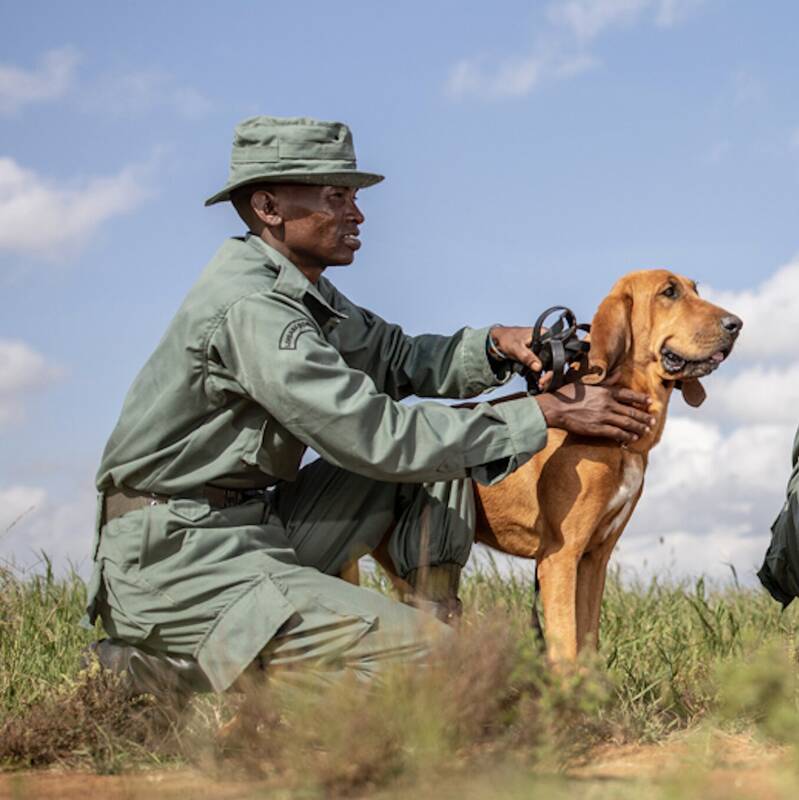
Anti-poaching Dogs Display
Approx. one hour
Interact with the dog keepers and learn about what it takes to look after the specially trained canine team. Guests are encouraged to try and evade the sniffer dogs, not only is this great fun, but it helps to offer genuine training for the dogs.
More about Anti-poaching Dogs Display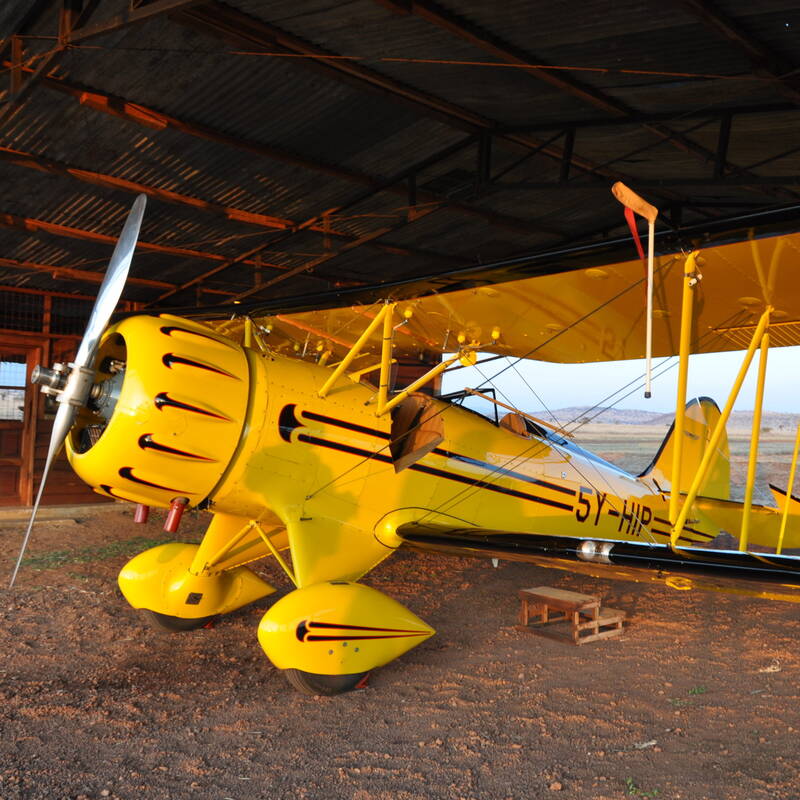
Scenic Biplane Flight on Lewa Conservancy
30 or 60 minute flights
Soar high and fly low over the rolling hills and plains of Laikipia’s famed Lewa Conservancy, on a scenic biplane flight. Offering you the chance to spot wildlife from the air, this flight takes place in an open-cockpit WACO biplane – a truly unique excursion in Kenya.
More about Scenic Bi-plane FlightOther lodges in Laikipia
Alternative places to stay in this same area.
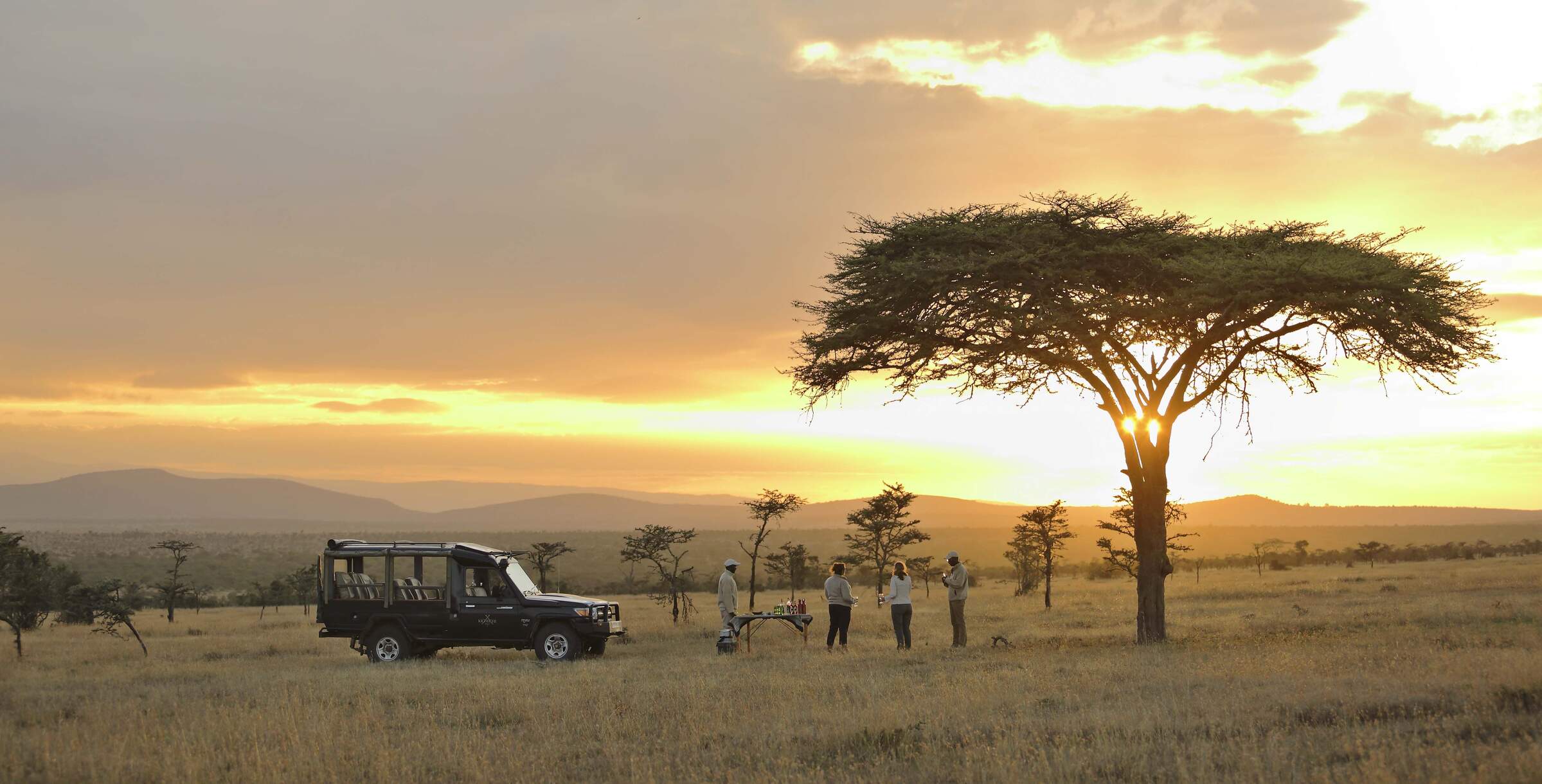
Kicheche Laikipia
Kicheche Laikipia is the most luxurious tented camp of the handful of places to stay in the Ol Pejeta Conservancy in central Laikipia.
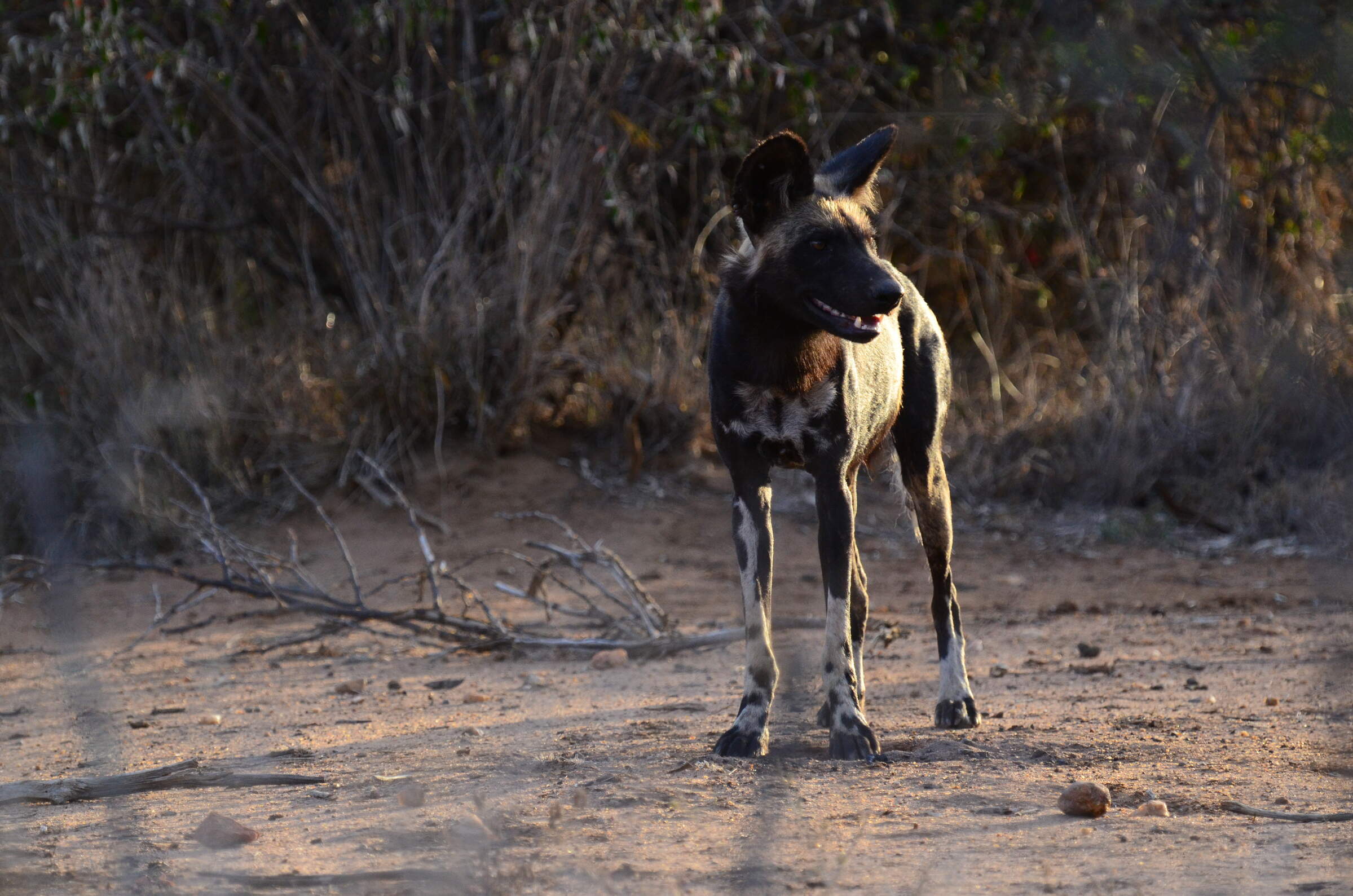
Laikipia Wilderness
Laikipia Wilderness is a rustic owner-managed bush camp, in excellent wild dog territory, offering outstanding guiding.
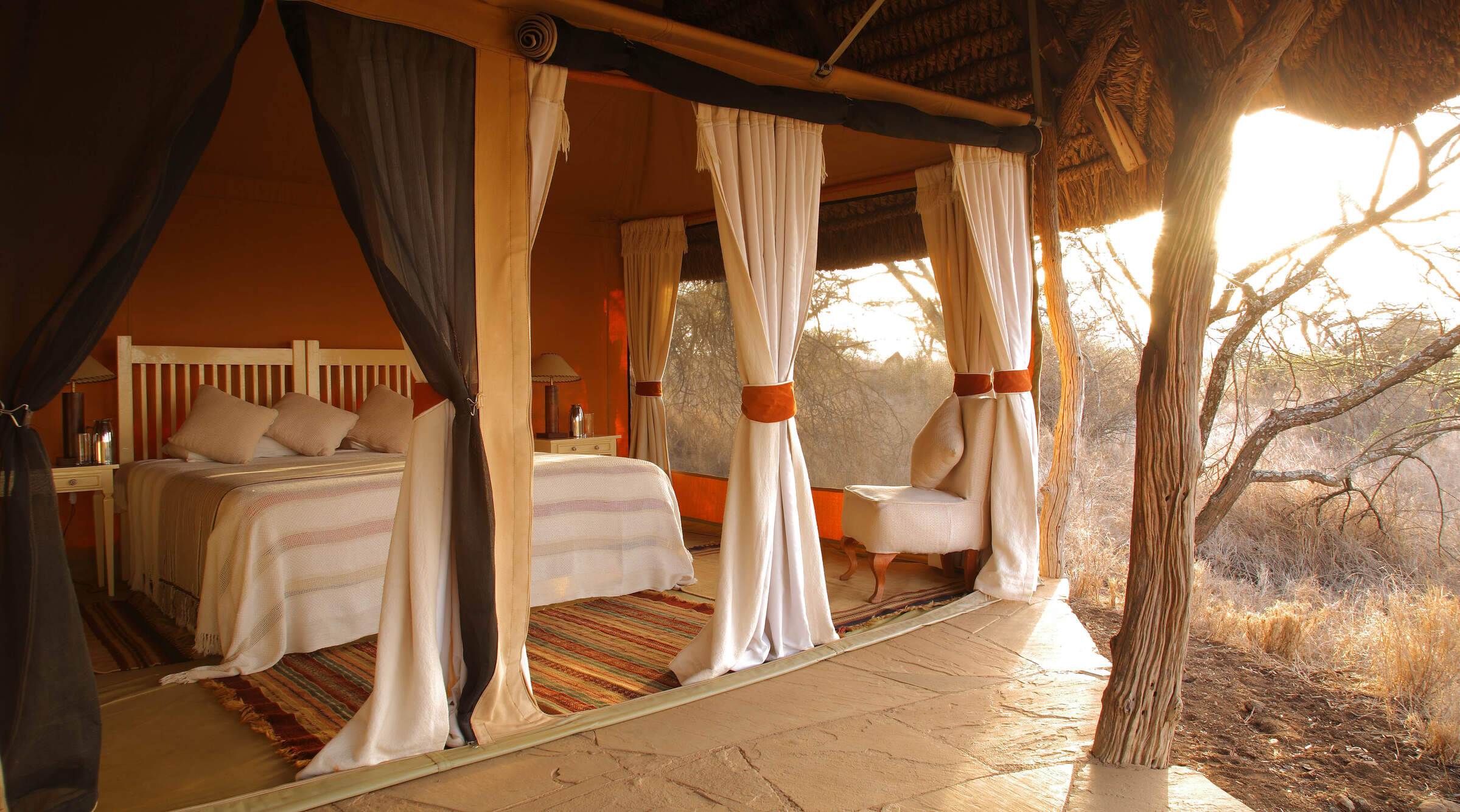
Lewa Safari Camp
Lewa Safari Camp is a comfortable and homely tented lodge, located in the Lewa Conservancy and offering a relatively exclusive safari away from mass tourism.
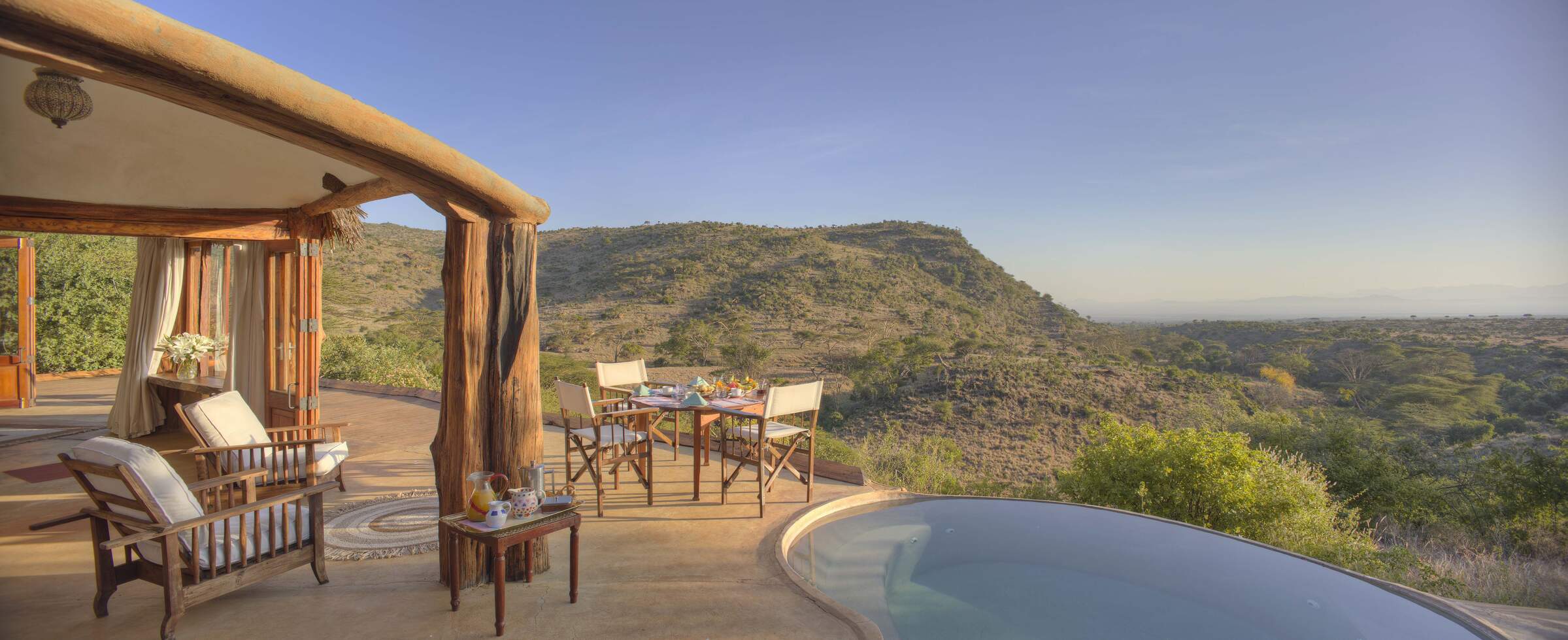
Lewa Wilderness
Lewa Wilderness is a comfortable, fenced safari lodge with nine cottages, great views and a huge range of activities.
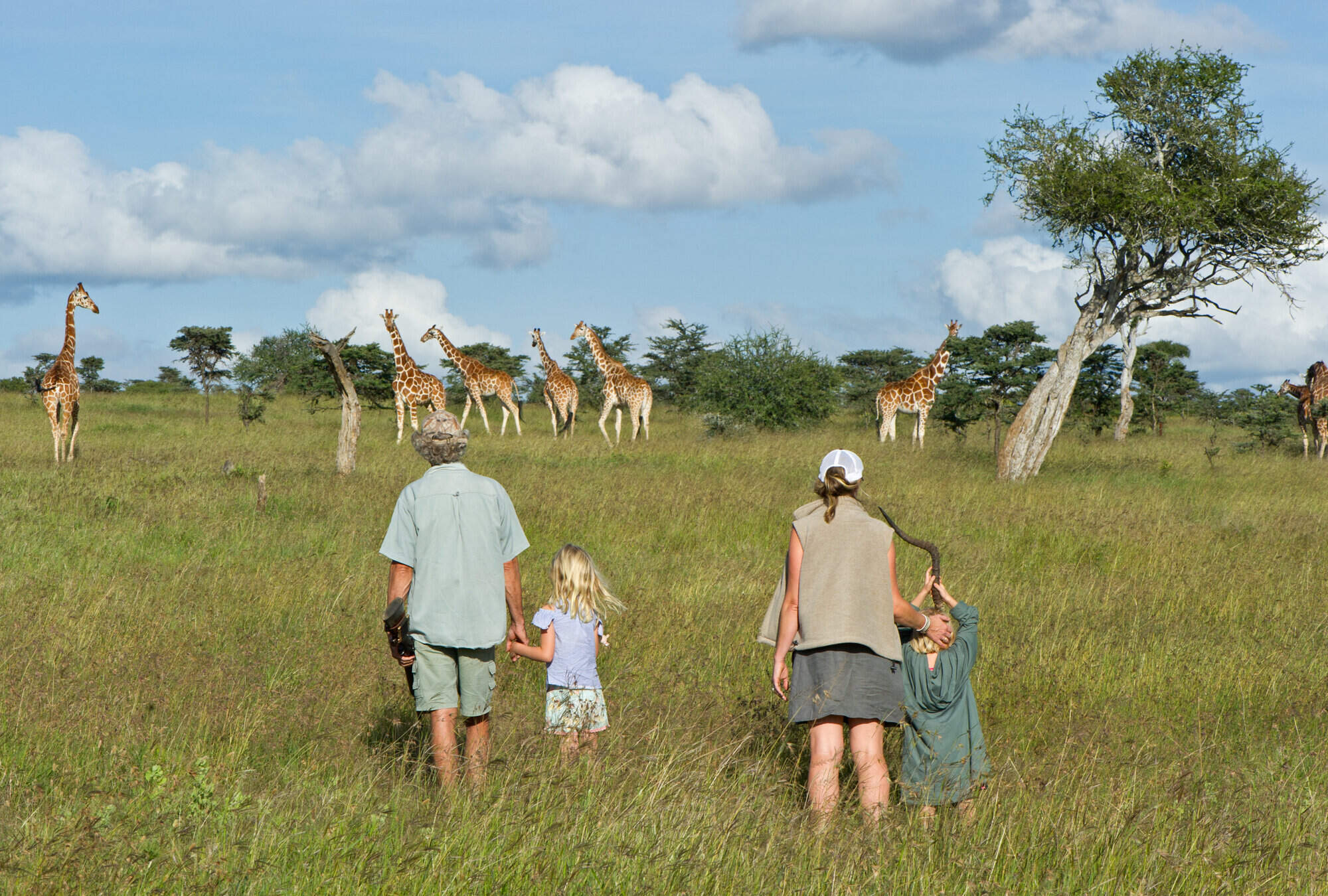
El Karama Lodge
El Karama is a comfortably rustic, very personal, riverside eco-lodge on a game-rich private ranch in Laikipia, an hour’s drive north of Nanyuki airport.
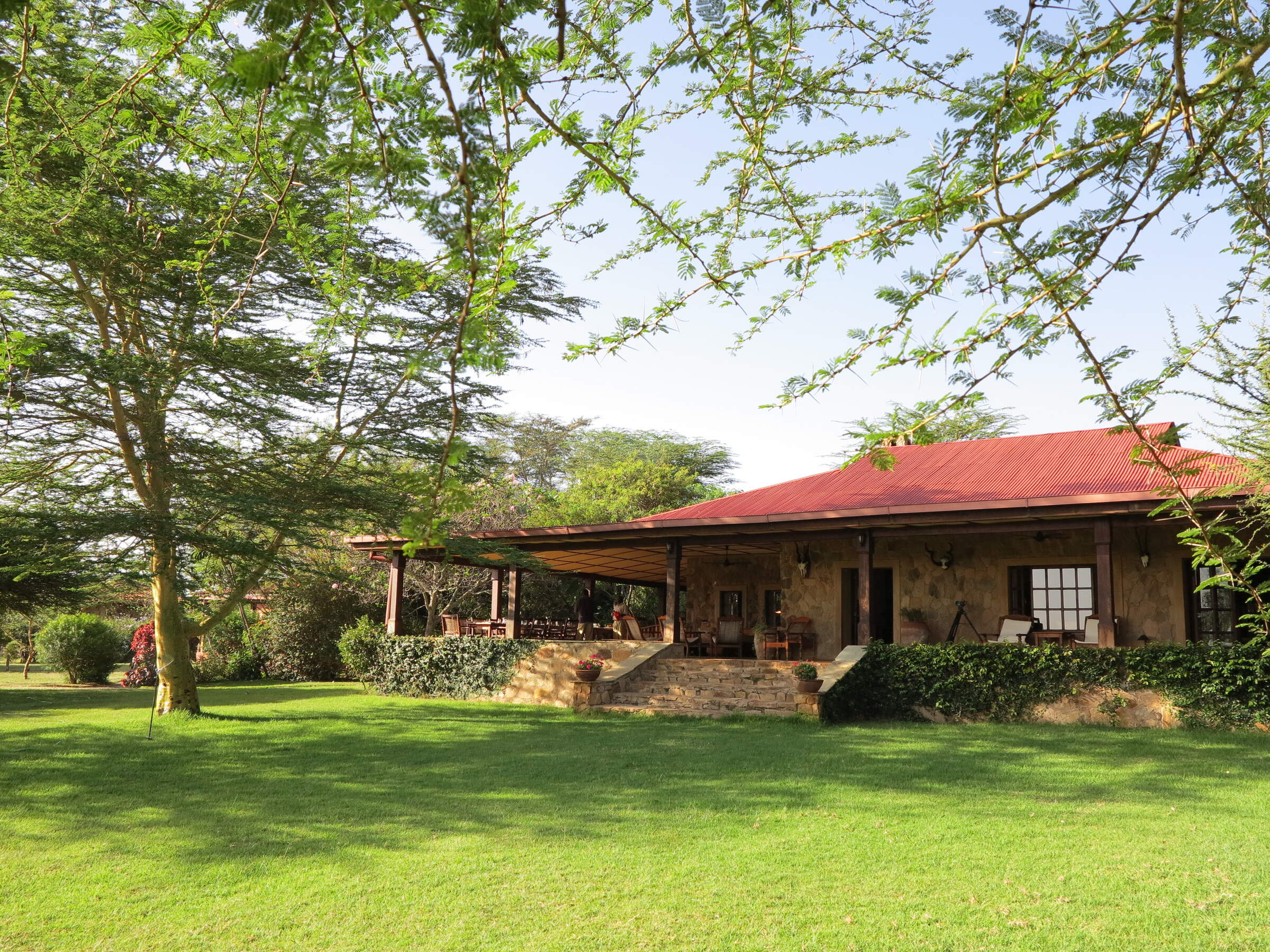
Sosian
Sosian Lodge is a distinctive, estancia-style ranch house on a former cattle ranch, with great opportunities for riding, relaxing and seeing wild dogs and other savannah wildlife.
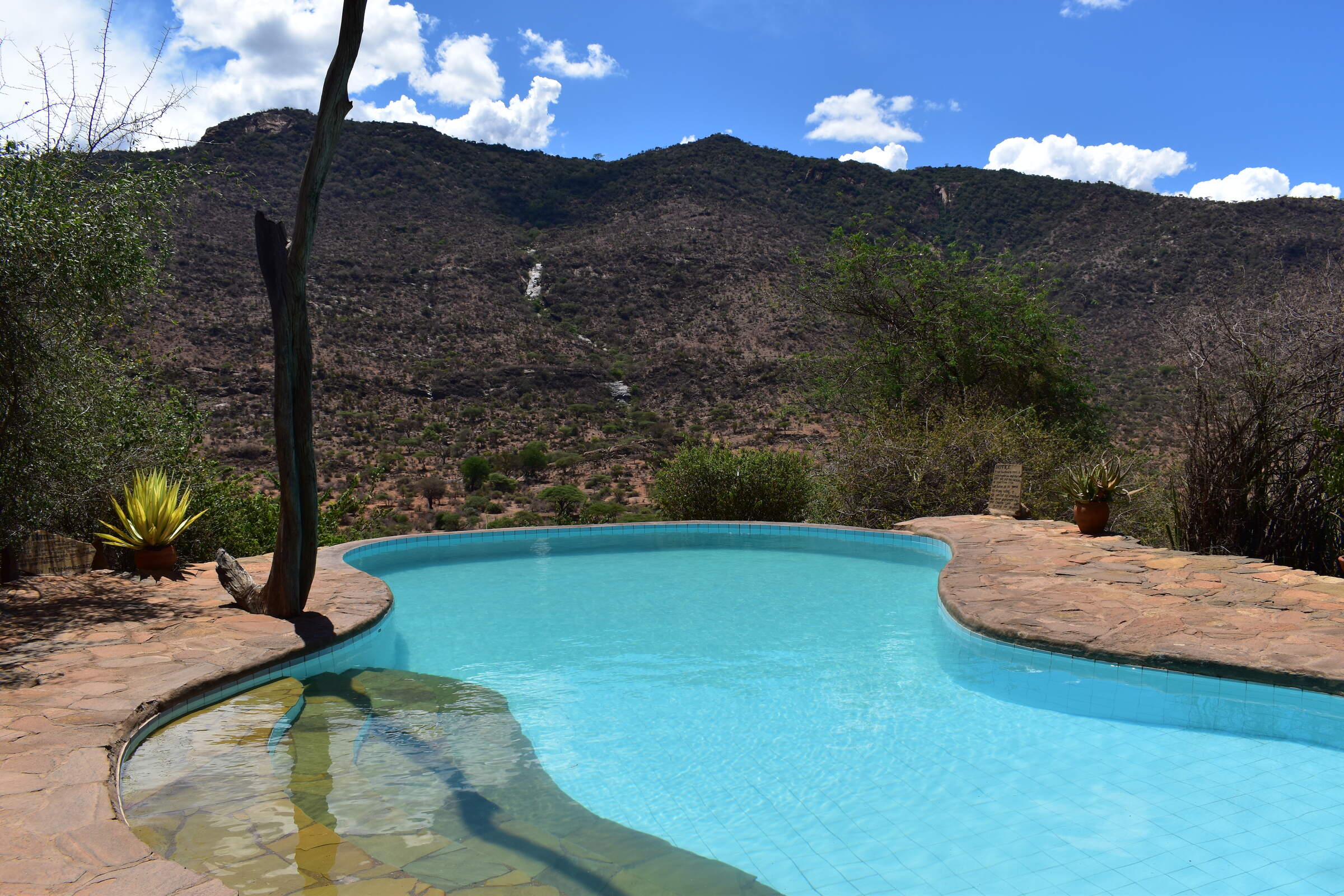
Il Ngwesi Eco-Lodge
The community-owned Il Ngwesi Eco-Lodge sits atop a small hill in the remote Il Ngwesi Group Ranch, a two-hour drive north of Lewa Conservancy in north-eastern Laikipia.
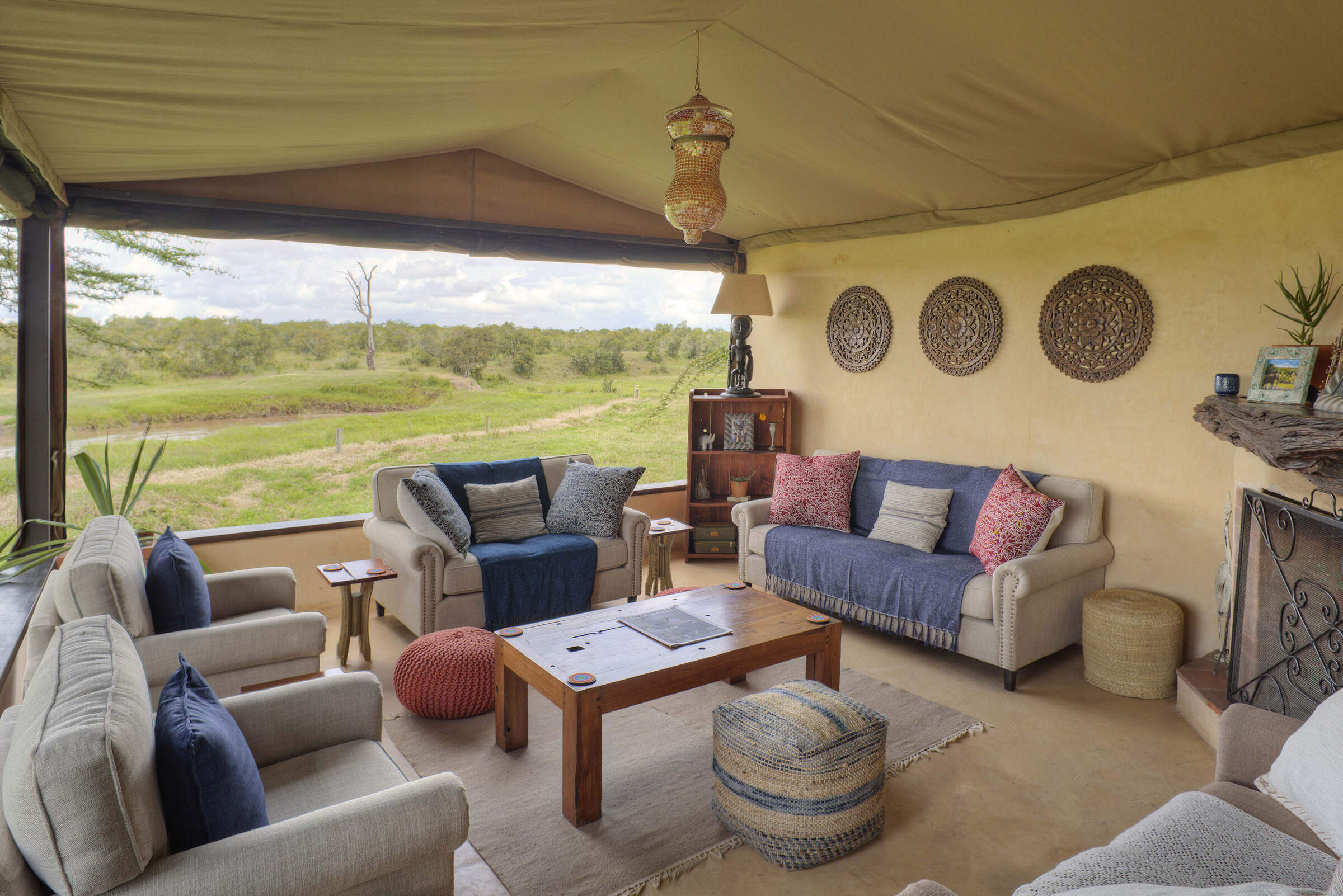
Ol Pejeta Bush Camp
Ol Pejeta Bush Camp is a simple camp, with comfortable tents, delivering an authentic wilderness experience backed up by good food and guiding.
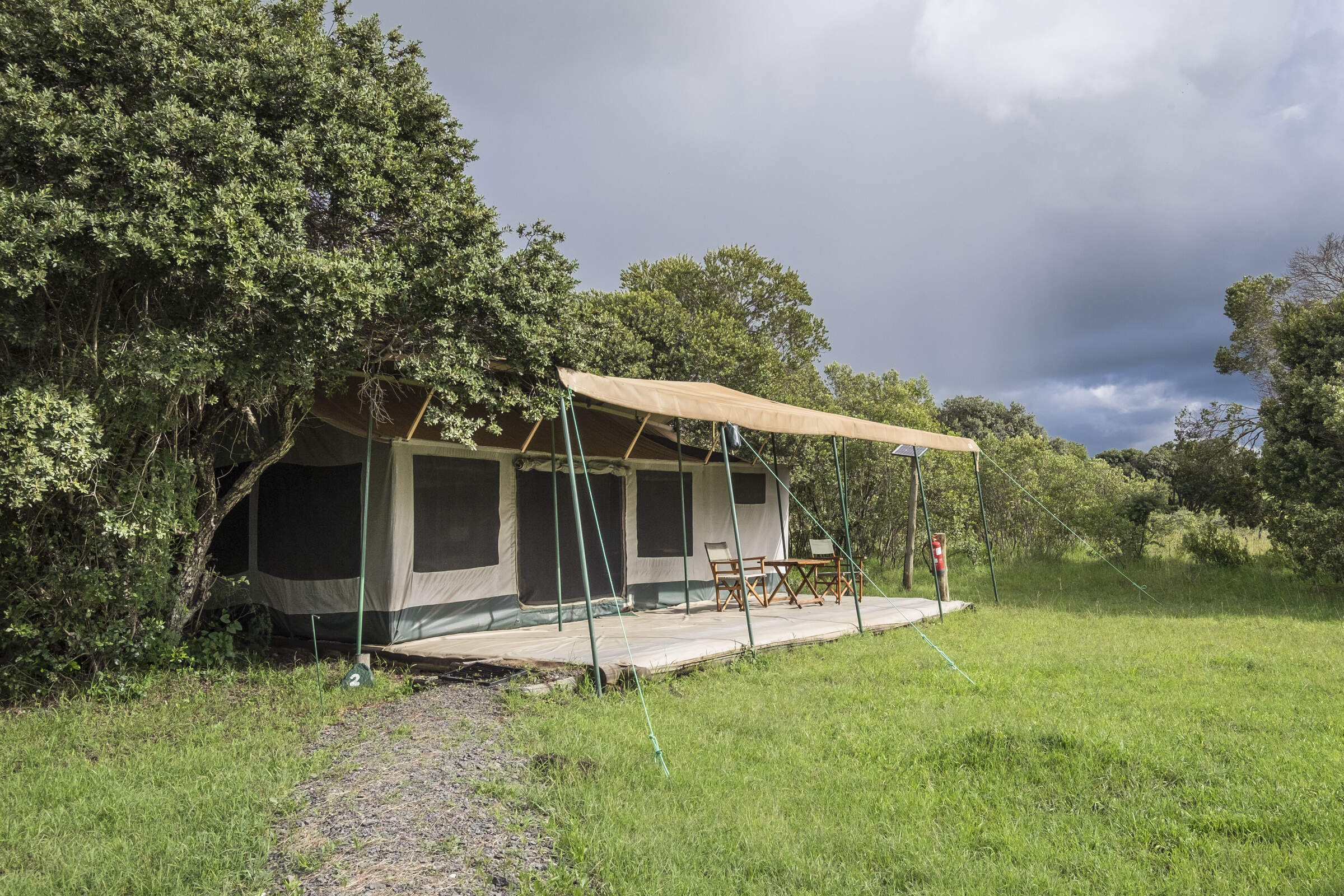
Porini Rhino Camp
Porini Rhino Camp is a small, simple, well established tented camp, with a keen focus on sustainable and low-impact tourism.
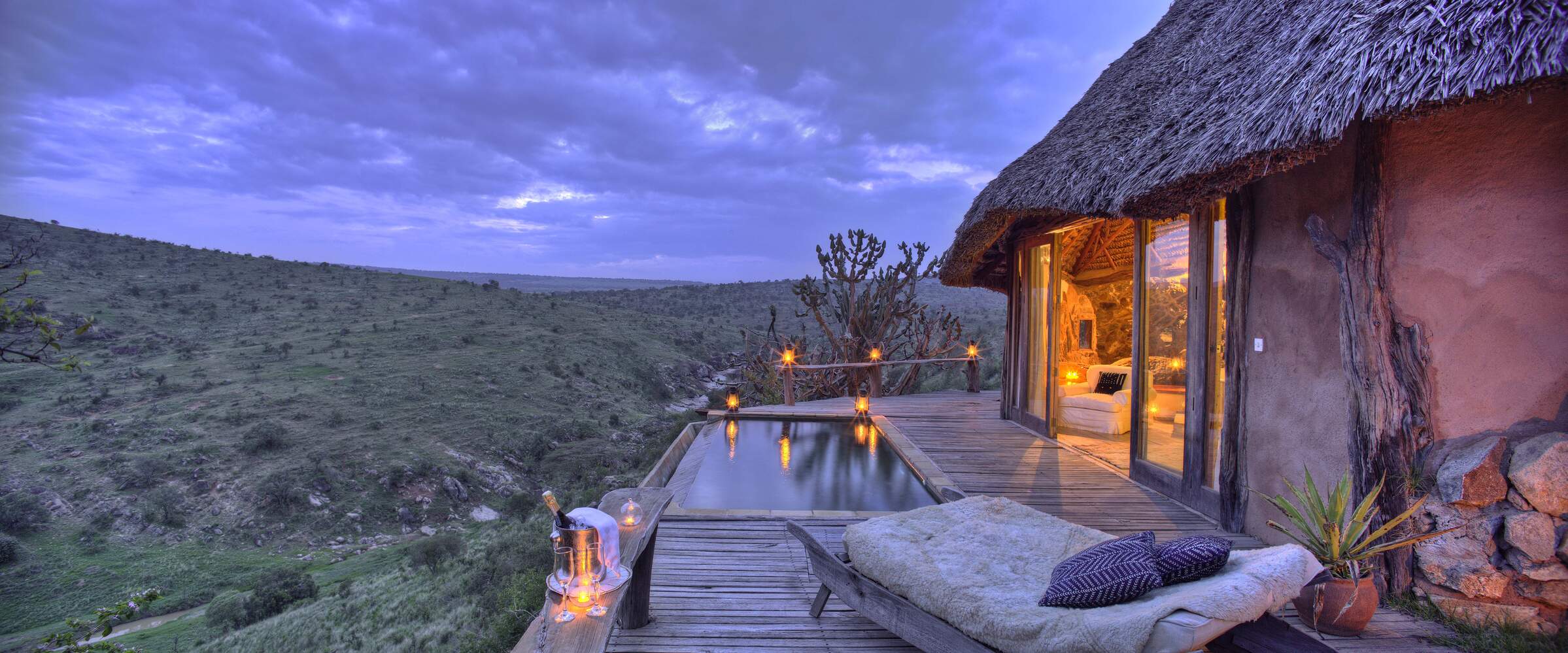
Borana
Borana is a comfortable and striking lodge on the Borana Conservancy in eastern Laikipia, offering pleasant accommodation with good food and service and a very wide range of activities.
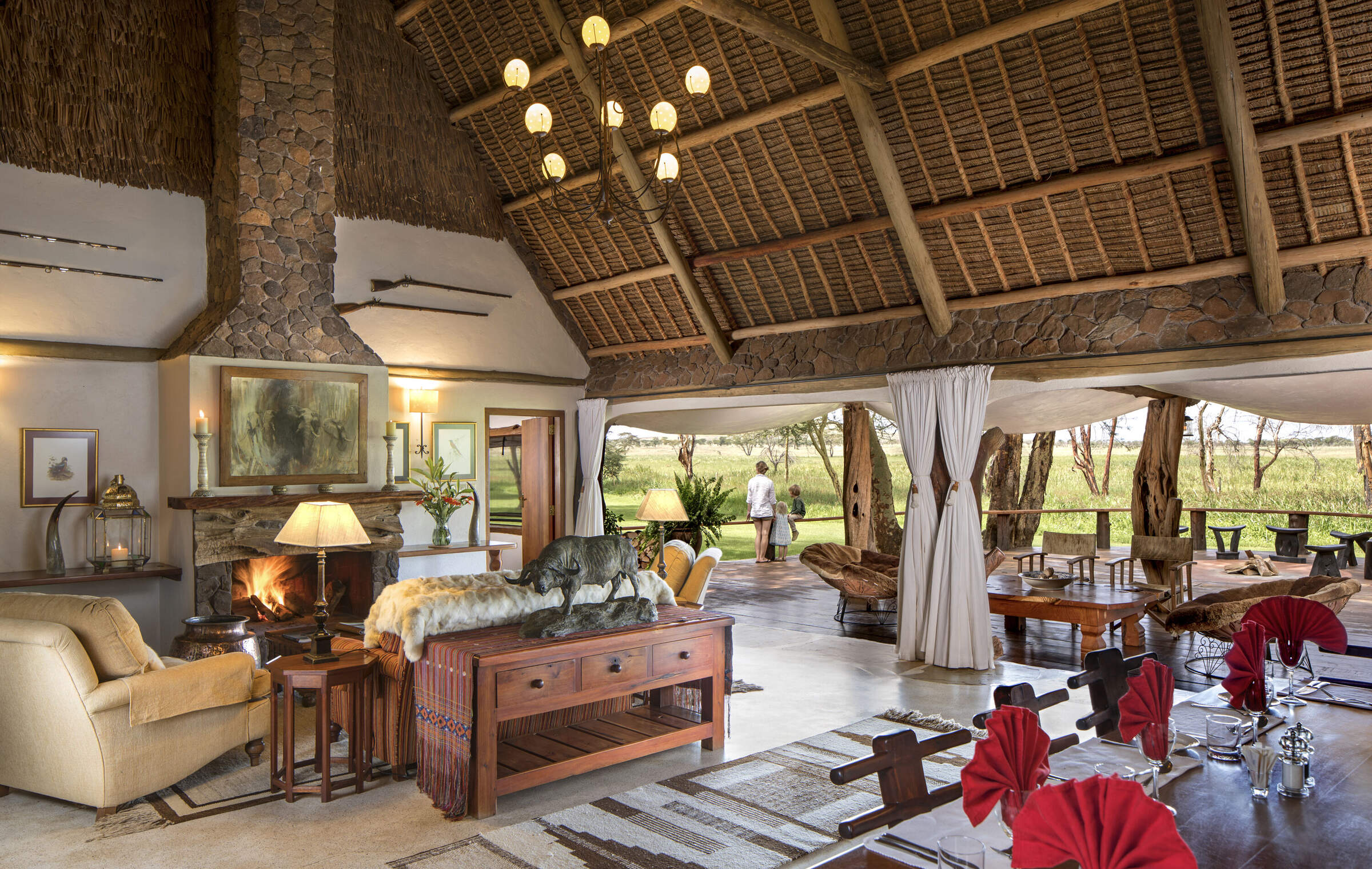
Sirikoi
Sirikoi is a small, very high-quality safari camp with excellent service and food and a wide selection of activities.
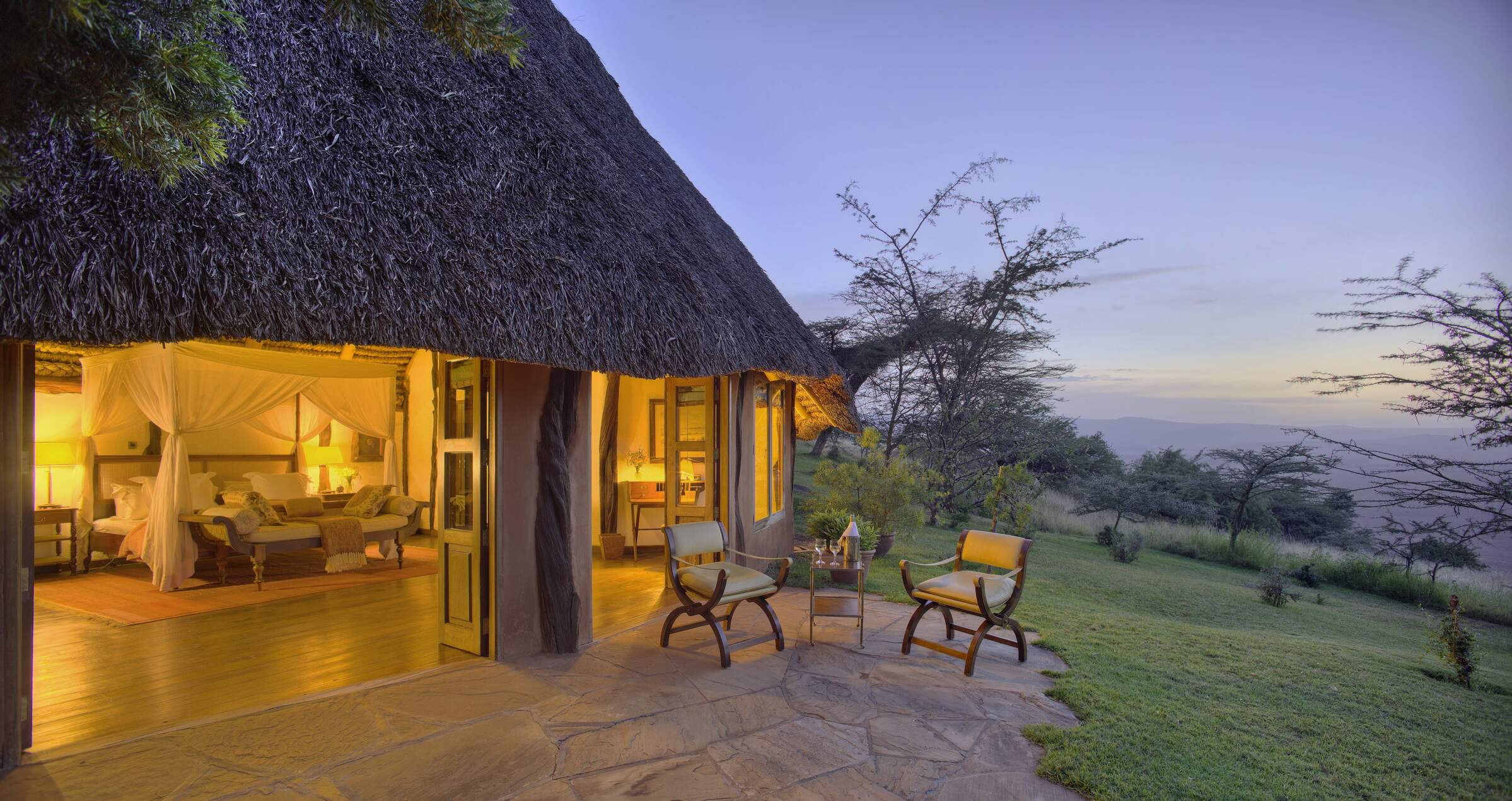
Kifaru House
Kifaru House is a small, stylish safari lodge in the Lewa Conservancy, with beautiful views across the landscape.
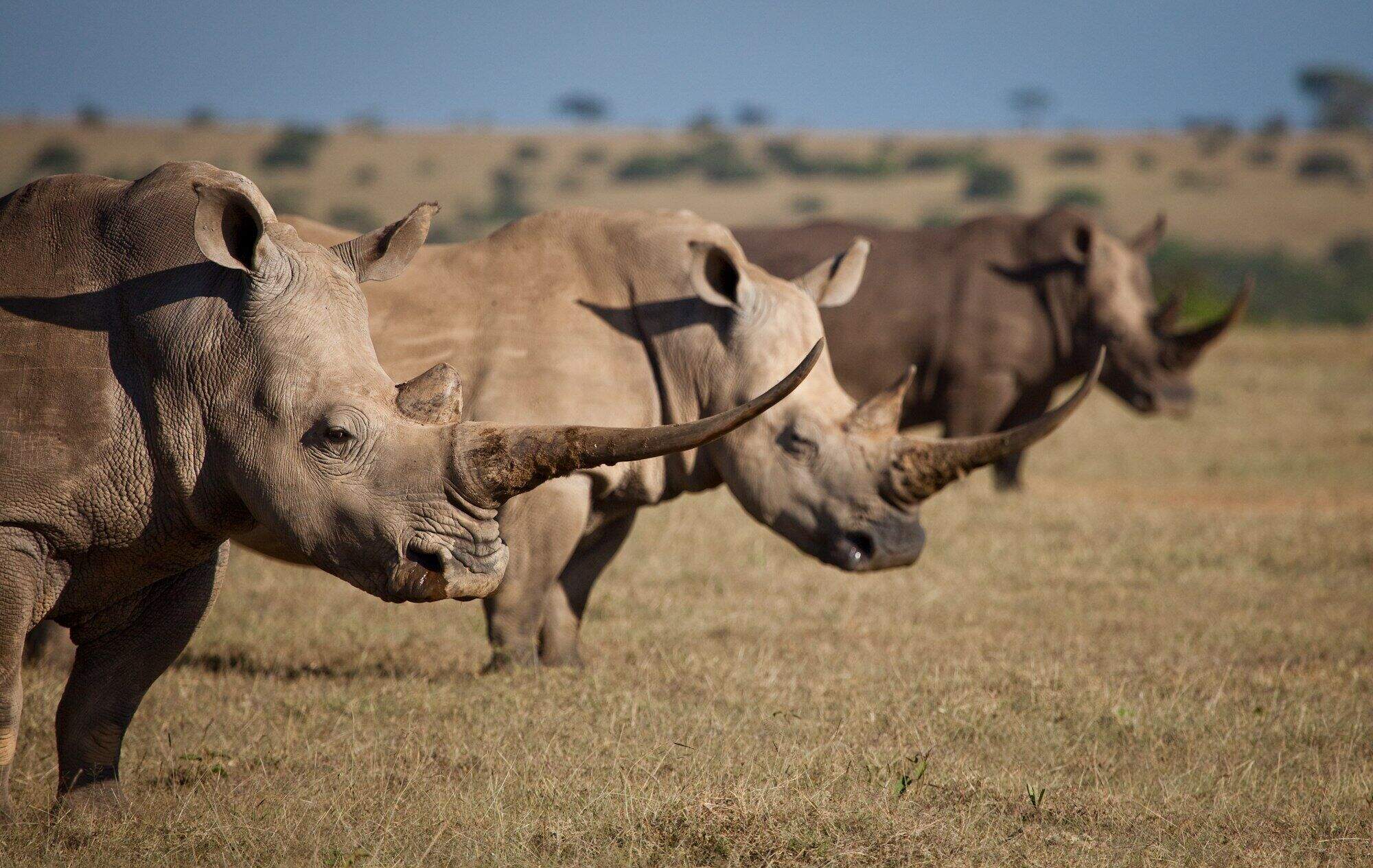
Solio Lodge
Solio Lodge is an exclusive and luxurious bush lodge set in the private Solio Game Ranch in southern Laikipia.
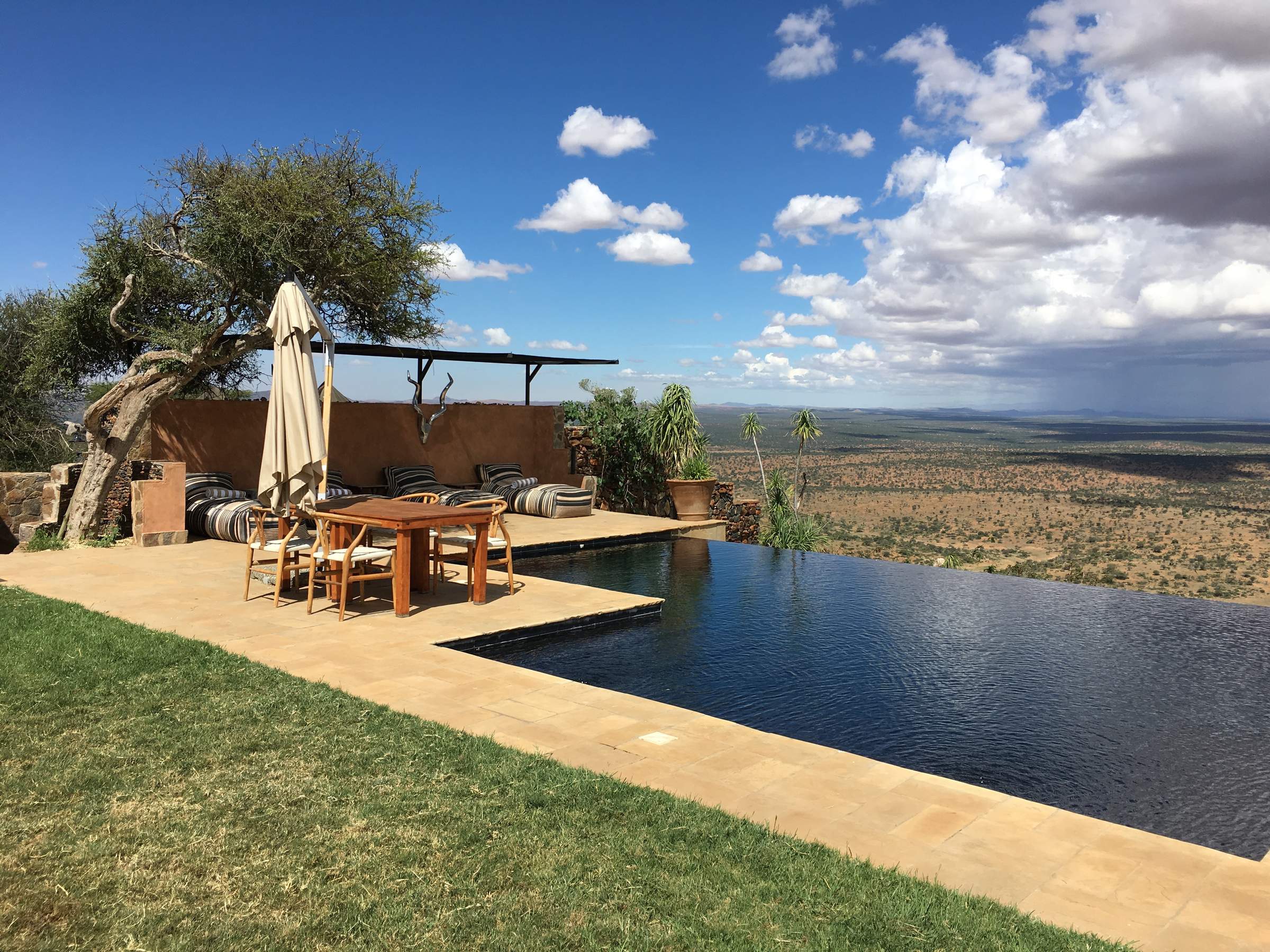
Loisaba Tented Camp
Loisaba Tented Camp is a luxury safari base of tented rooms, ranged along a ridge in the Loisaba Conservancy, facing Mount Kenya. The camp was completely rebuilt in 2016.
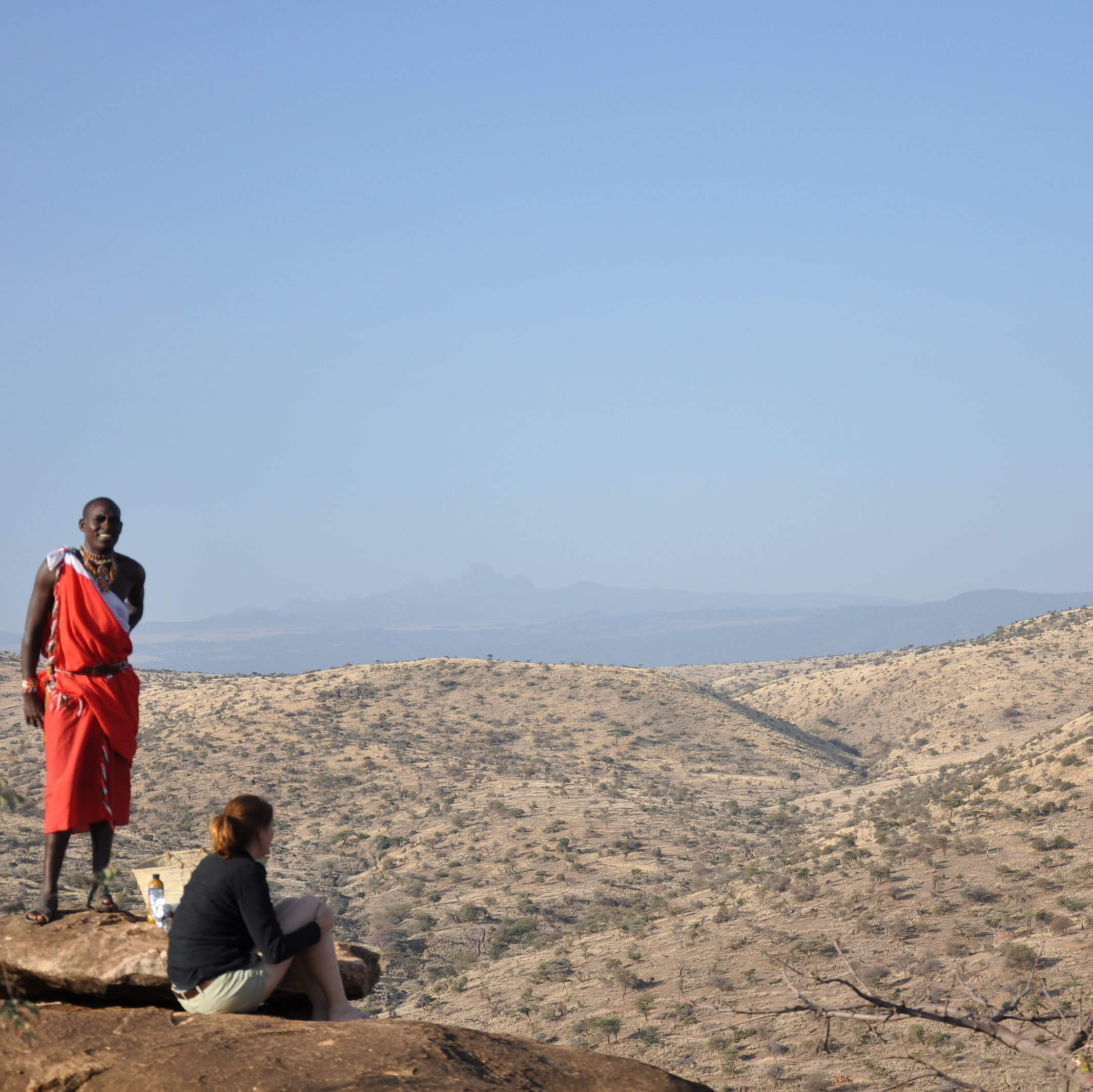
Tassia Lodge
Tassia offers a unique wilderness experience in a remote location: come here for cultural interaction, stunning views and something a bit different.
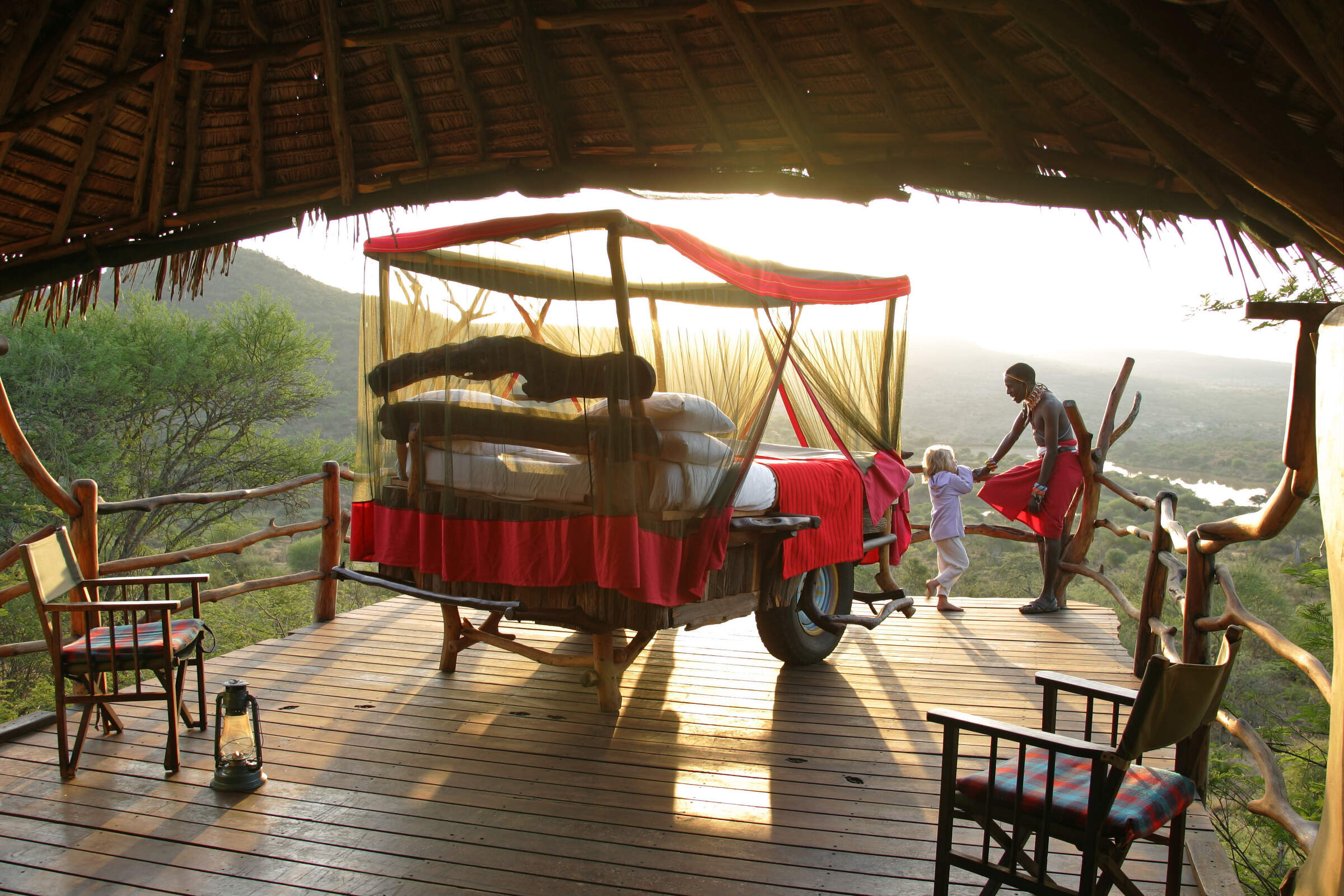
Loisaba Star Beds
Loisaba Starbeds is a simple camp of 4 rooms with pull-out, open-air 'star beds', located near a dam in the Loisaba Conservancy, in northwestern Laikipia.
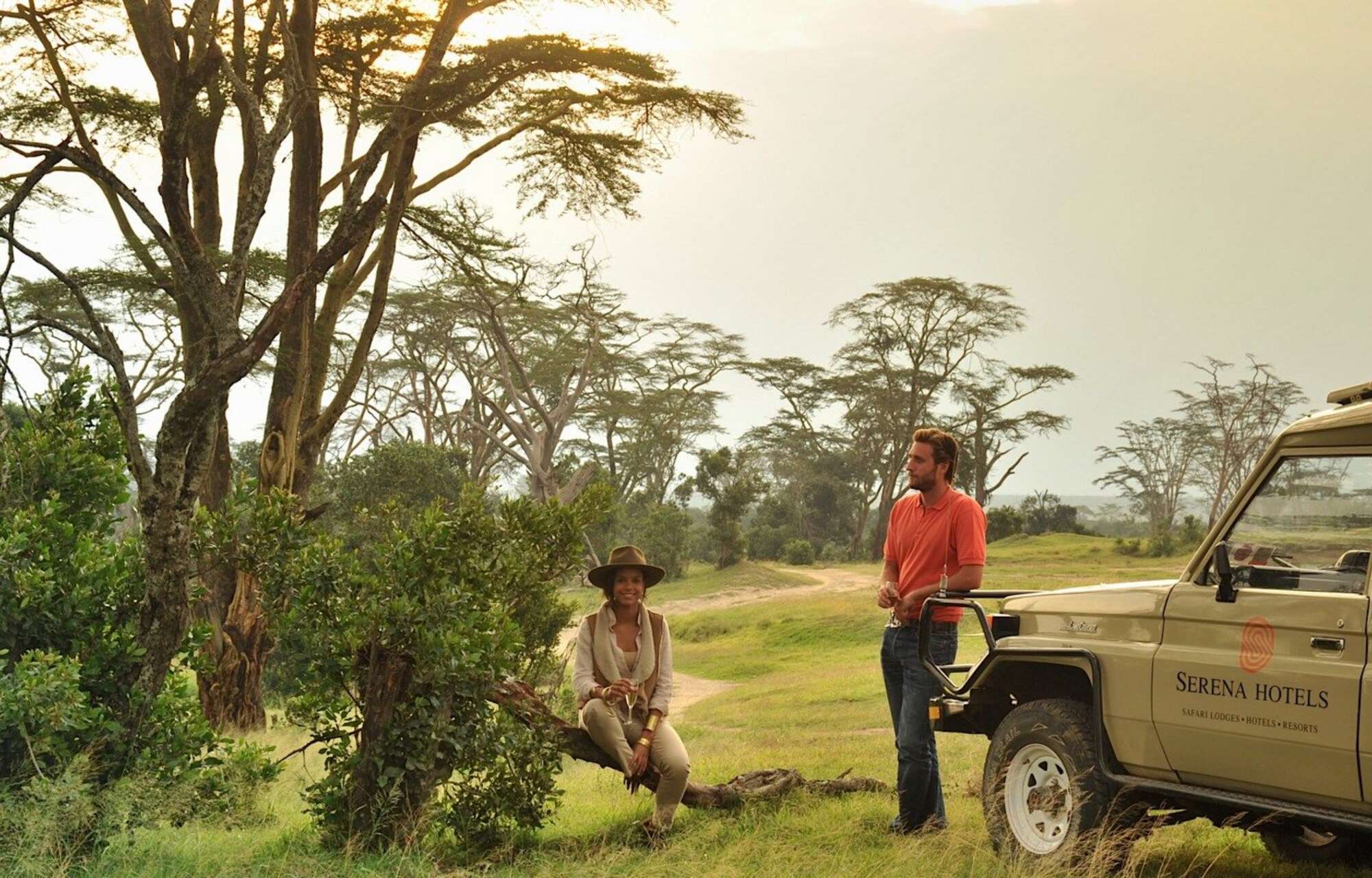
Sweetwaters Serena
Sweetwaters Serena is a large, older tented camp – the largest camp in the Laikipia region – in the eastern part of the Ol Pejeta Conservancy.
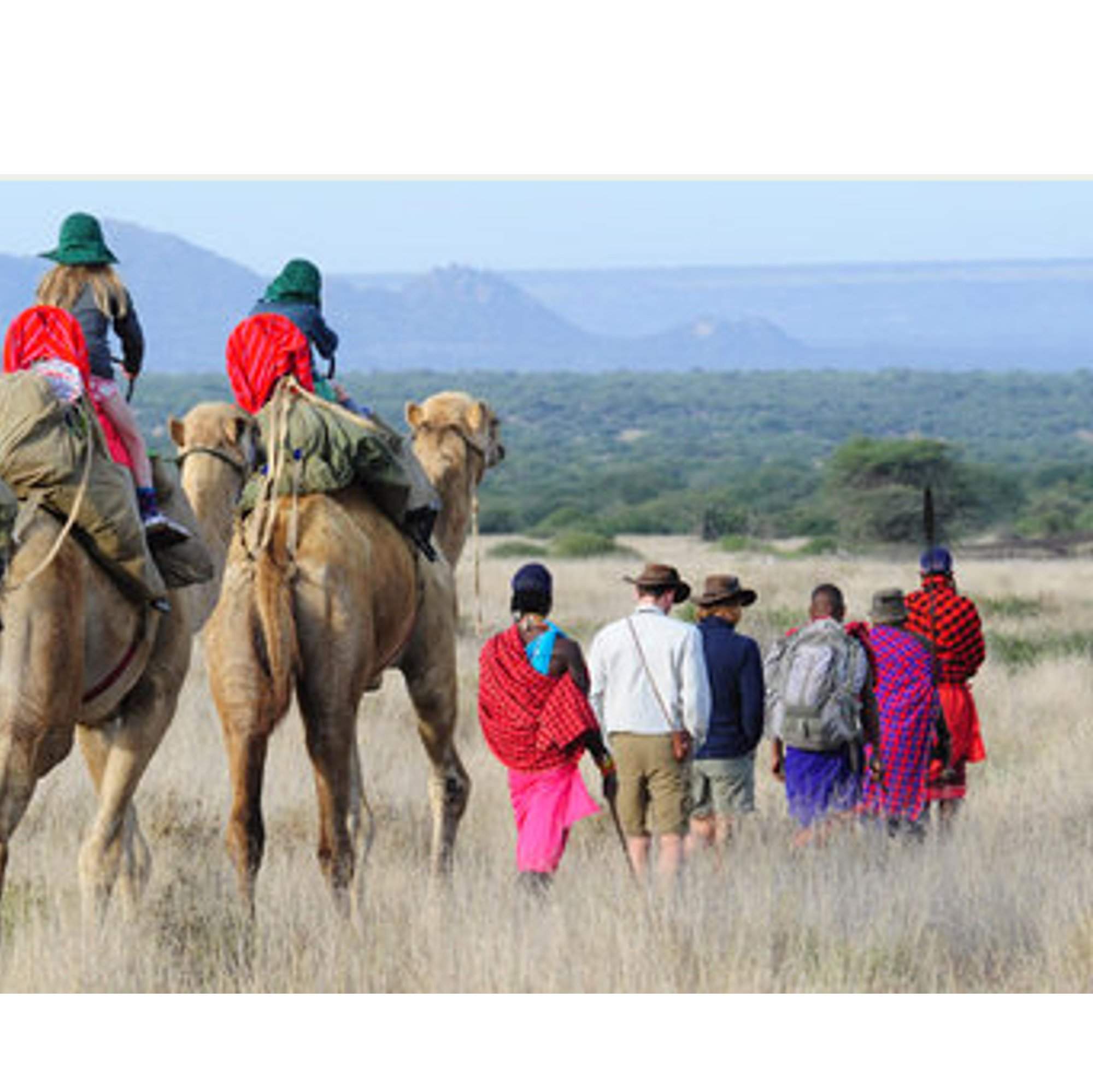
Karisia Walking Safaris
Karisia Walking Safaris operates camel assisted, multi-day walking safaris from its main camp, Tumaren, set in a remote part of Laikipia.
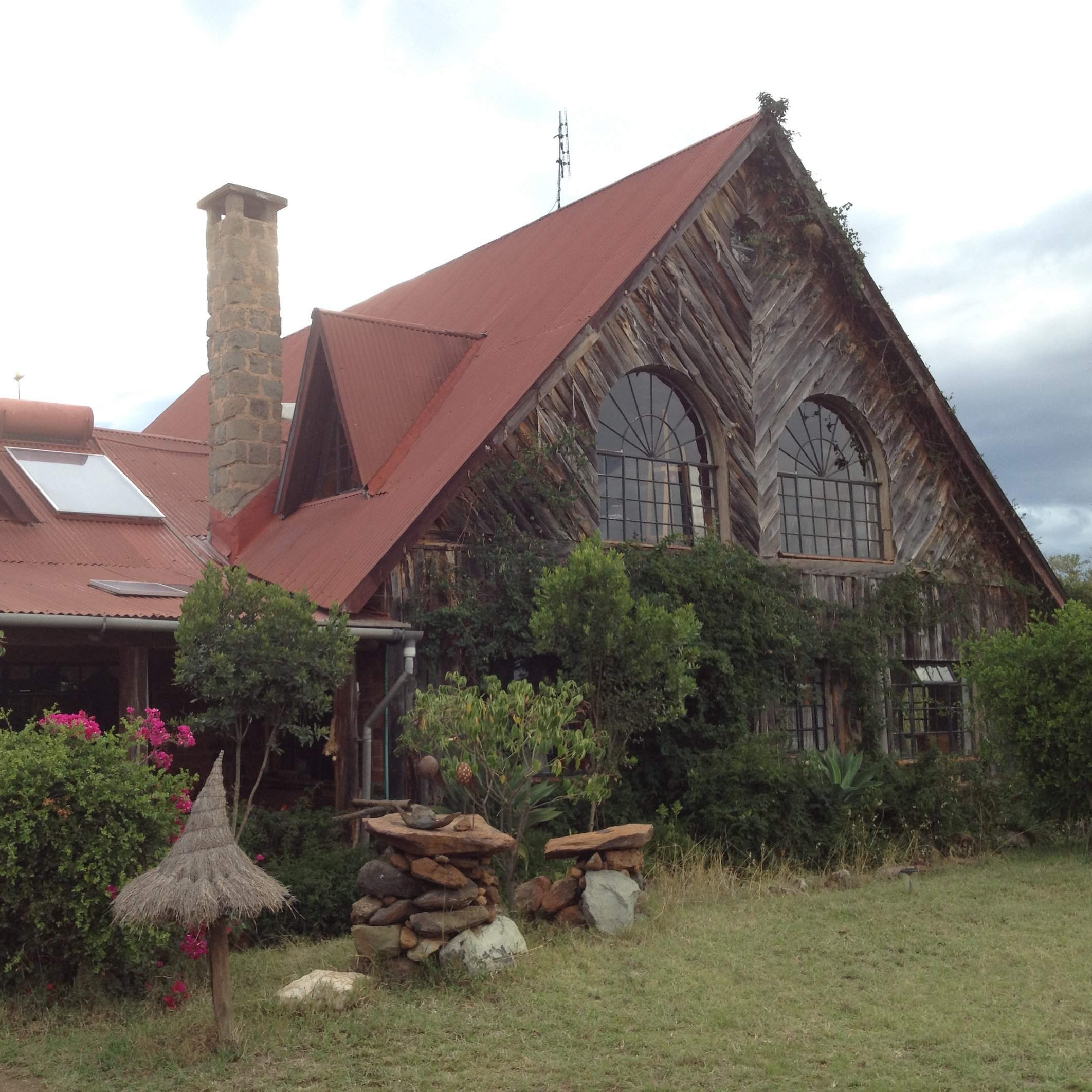
Sandai
Sandai is a pretty, owner-run homestay, set between the Aberdare Range and Mount Kenya, offering a range of activities at extra cost.
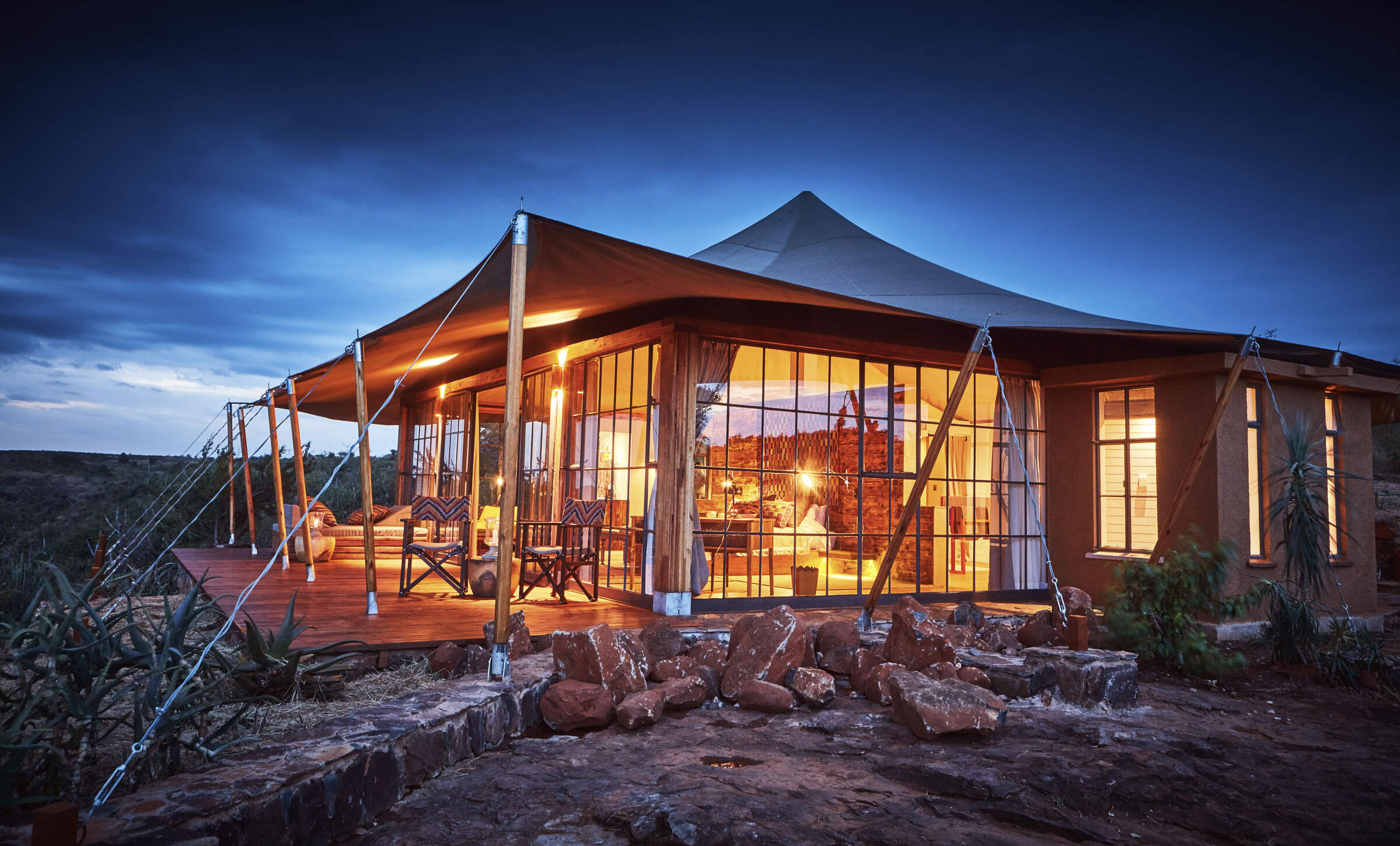
Lodo Springs
Lodo Springs is a spectacularly located luxury lodge in a remote spot in the Loisaba Conservancy, sister lodge to Loisaba Tented Camp and Loisaba Star Beds.
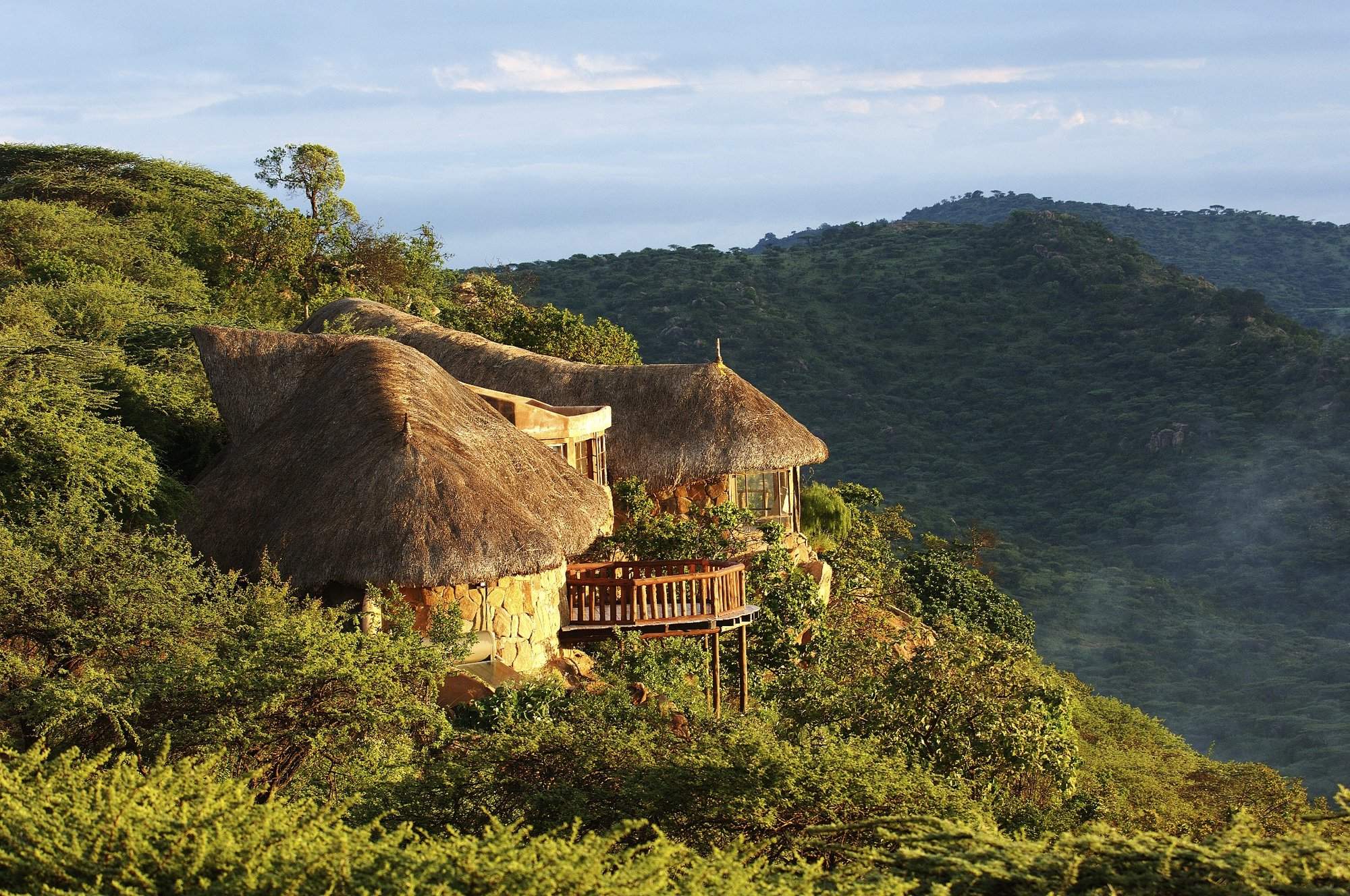
Sanctuary at Ol Lentille
The Sanctuary at Ol Lentille is an unusual safari lodge in northern Laikipia, consisting of three exclusive villas, and offering a huge range of activities.
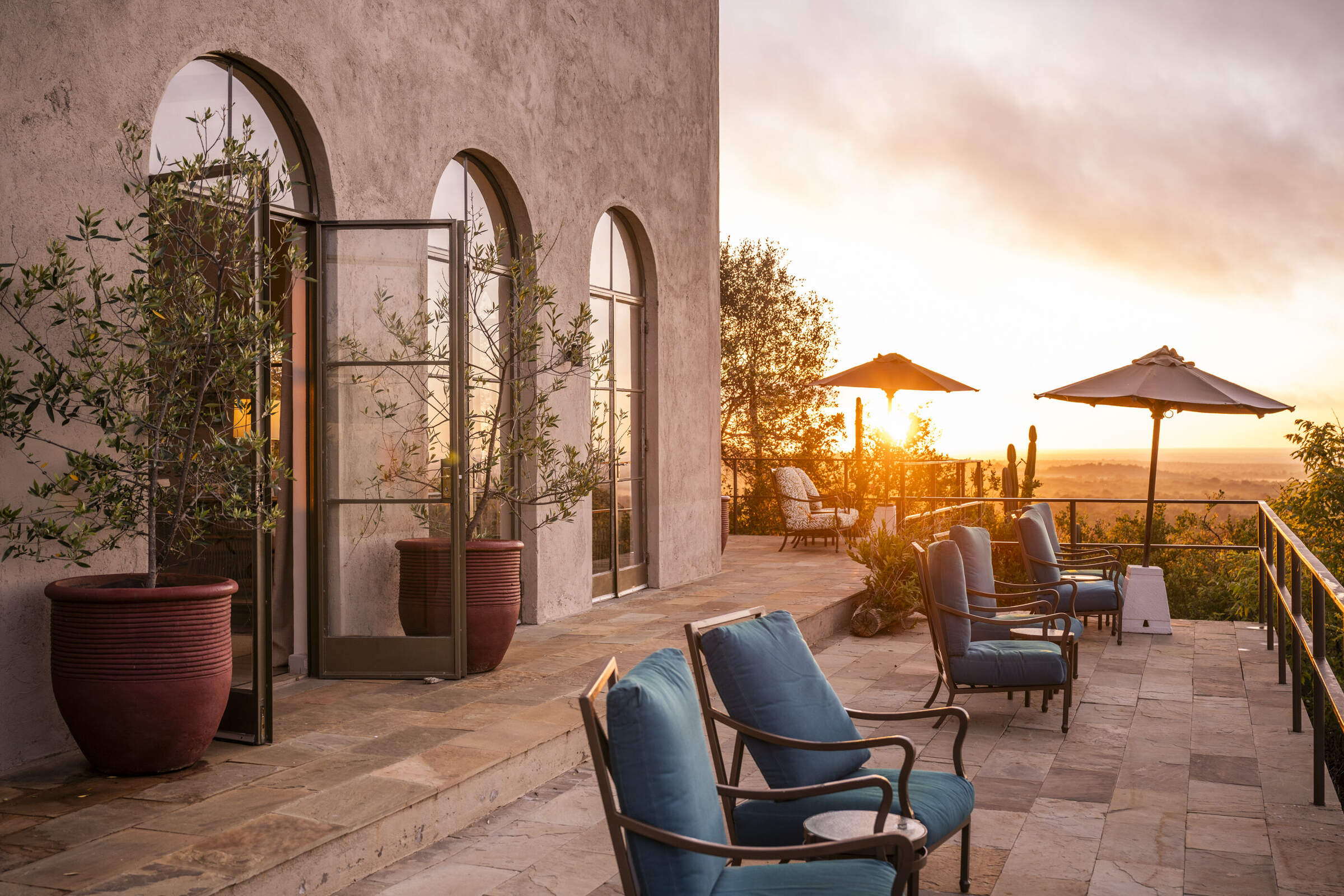
Governors' Mugie House
Governors' Mugie House – a substantial, luxury safari lodge – is one of only two properties in the Mugie Conservancy in northwestern Laikipia.
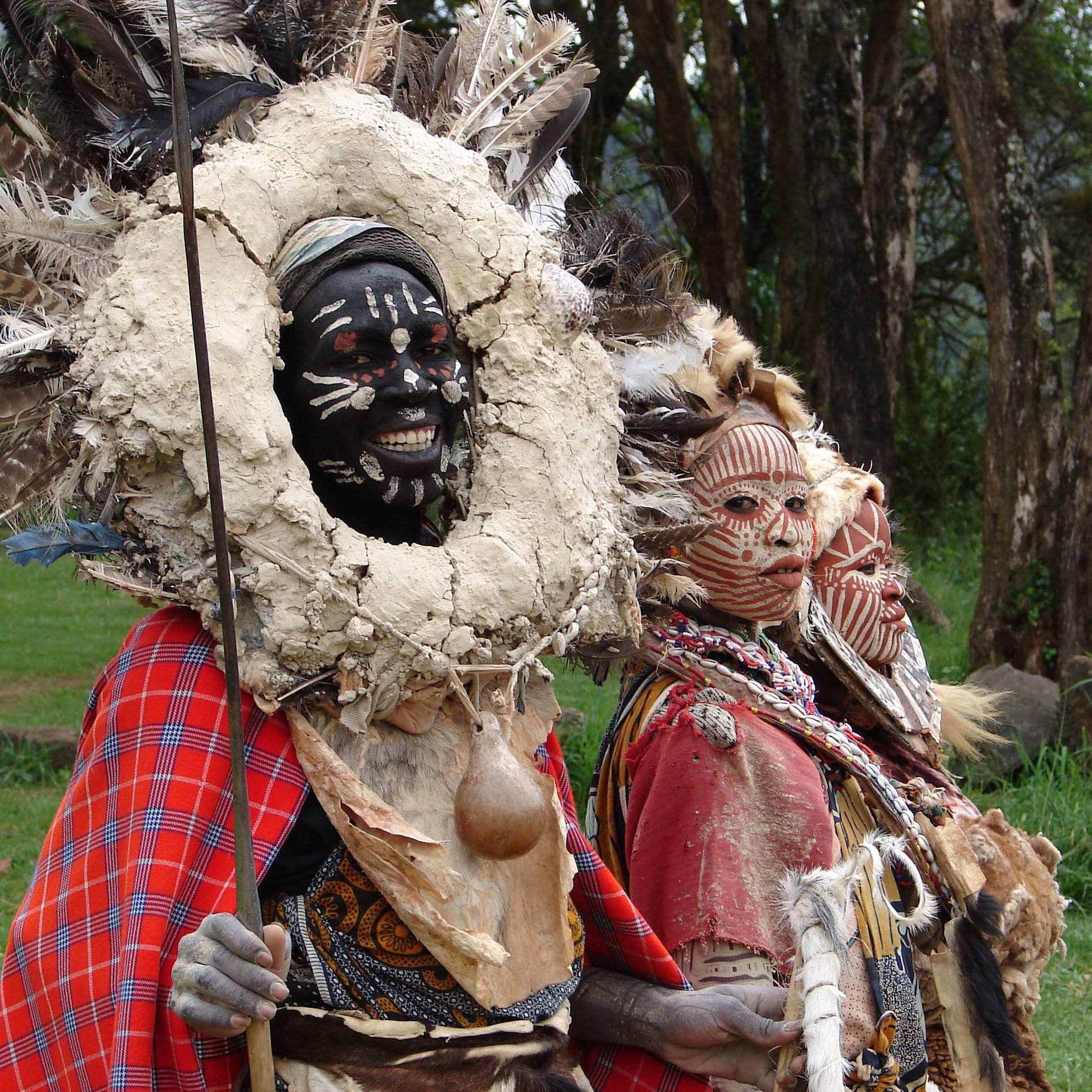
Thomsons Falls Lodge
Thomsons Falls Lodge is a simple hotel dating back to the colonial era, located above the falls of the same name, near the western Laikipia town of Nyahururu.
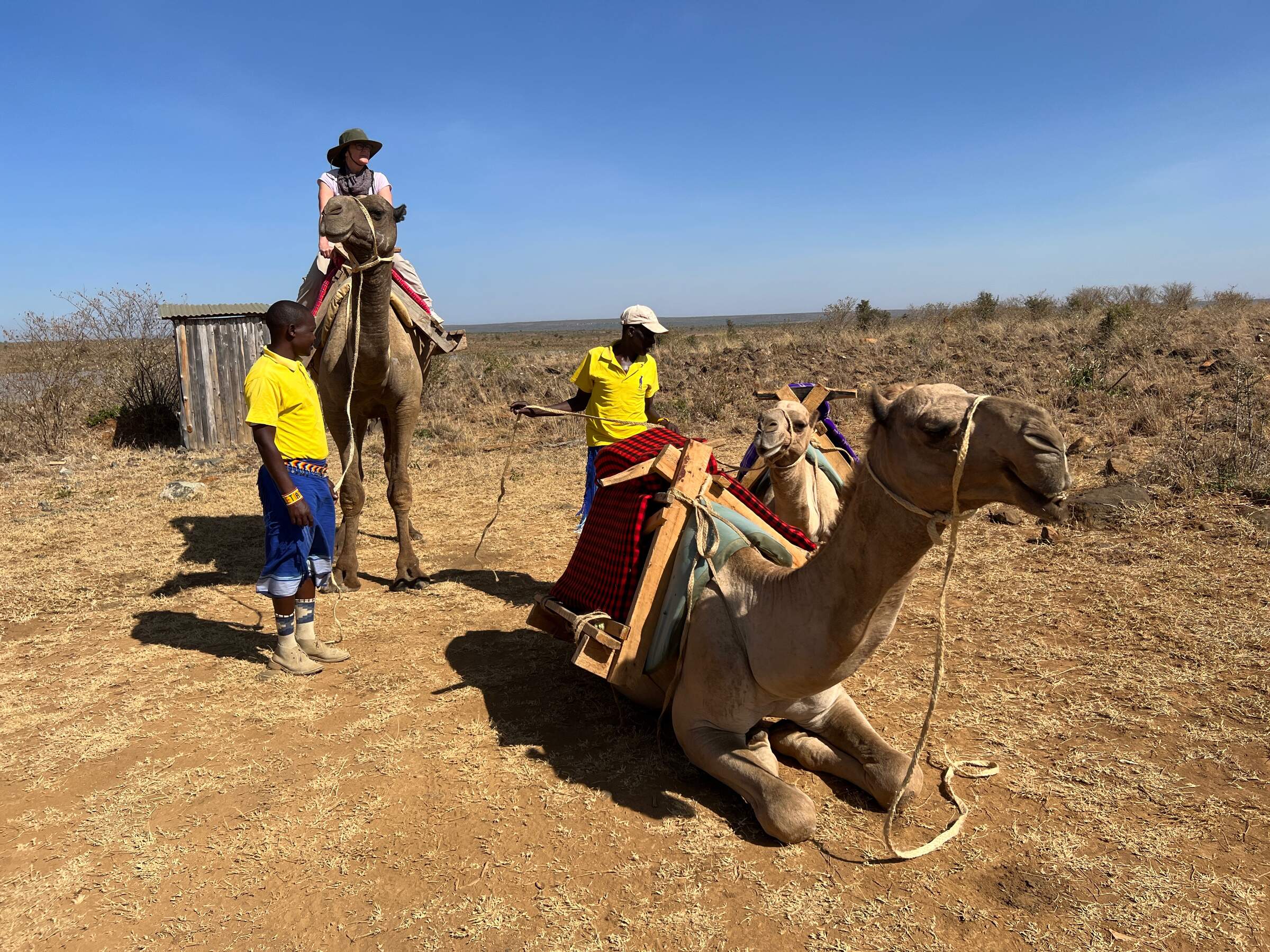
Ekorian's Mugie Camp
Ekorian's Mugie Camp is a pleasant, family-friendly safari camp in a remote location in northwestern Laikipia.
When to go to Laikipia
Our month by month guide: What it's like to visit Lewa House in Laikipia
Jan
Feb
Mar
Apr
May
Jun
Jul
Aug
Sep
Oct
Nov
Dec
Laikipia in January
Clear, warm days and mild nights make this a popular time for safaris in Laikipia. It's excellent for game viewing in all the conservancies, where water sources attract diverse wildlife. The dry conditions make it easier to spot black rhinos, lions and leopards. Star bed sleep-out options at a number of lodges are particularly magical under the clear night skies.
After the New Year period, many camps and lodges treat January as mid-season, offering good value. The landscape retains some greenery, enhancing photography.
- Clear days ideal for safaris
- Excellent visibility for wildlife viewing
- Dry riverbeds attract wildlife to water sources
- Calving season for wildebeest and antelopes
- Palearctic migrant birds abundant
Our view
Fantastic: the very best time to visit
Weather in January
Laikipia in February
With the short dry season well established in Laikipia, wildlife gathers close to water points, making it an excellent time for safaris. Ol Pejeta and Lewa Wildlife Conservancies offer prime viewing opportunities for endangered species like black rhinos and Grevy's zebras. Solio Rhino Conservancy provides exceptional black rhino sightings during this period. The grass is grazed down, improving visibility across the region.
February is ideal for walking safaris, where you can appreciate the smaller details of the ecosystem. The clear skies make stargazing from star beds an unforgettable experience. Cultural visits to local communities are particularly rewarding, as the pleasant weather encourages outdoor activities and interactions.
- Prime time for wildlife gathering near water
- Ideal conditions for walking safaris
- Palearctic migrant birds still present
- Low rainfall makes game drives rewarding
Our view
A very good time to visit
Weather in February
Laikipia in March
As March progresses in Laikipia, the weather becomes increasingly hot and humid with more rain likely later in the month. Through most of the month, conditions are still good for game drives in most districts. As the month advances, the buildup to the rainy season becomes apparent.
This period can offer unique photographic opportunities as animals congregate around diminishing water sources. Accommodation costs decrease as the low season approaches.
- Early month offers great wildlife viewing
- Hot weather transitions to occasional rains
- Lower visitor numbers
- Lush vegetation begins to appear
Our view
A good time to visit, with pros & cons
Weather in March
Laikipia in April
April usually sees established, serious rainfall in much of Laikipia, transforming the landscape. The southeast monsoon wind brings cooler temperatures and frequent downpours. While game viewing can be challenging due to lush vegetation, the green season offers unique experiences, with new-born animals visible among the verdant scenery.
The landscape bursts into life with vibrant colours, ideal for photography. Birdwatching is excellent with many species breeding. This is a quieter time for tourism, with lower accommodation rates at many places allowing for a more exclusive safari experience for great levels of service.
- Long rains begin, transforming landscapes
- Green season offers unique photo opportunities
- Lower rates at Laikipia's luxury lodges
- Buffalo and zebra calving season commences
- Birdwatching excellent
Our view
A good time to visit, with pros & cons
Weather in April
Laikipia in May
May in Laikipia is characterised by ongoing rains and lush vegetation. While game viewing can be trickier, the vibrant landscapes offer spectacular photographic opportunities with very little dust. The landscapes are a sea of green, with diverse and thriving flora.
This is an excellent time for birdwatching across the region as breeding season continues. The Ewaso Nyiro river swells impressively. Despite potential challenges, patient visitors may witness dramatic scenes of predators hunting in the thick vegetation.
- Lush vegetation makes wildlife spotting trickier
- Great for landscape and nature photography
- Rutting season for wildebeest and impalas
- Frog breeding season in Laikipia's wetlands
- Mount Kenya views improve with clearer air
Our view
A good time to visit, with pros & cons
Weather in May
Laikipia in June
As June progresses in Laikipia, the rains give way to slightly cooler, cloudy weather. This transition marks the beginning of a long, generally dry, high season for visitors. Game viewing improves as vegetation starts to thin, and conditions are comfortable.
The Ewaso Nyiro river, still full from the rains, attracts diverse wildlife. Accommodation rates begin to rise, reflecting the start of peak season.
- Rains subside, ushering in cooler weather
- High season begins with increased visitors
- Comfortable conditions game viewing
Our view
A good time to visit, with pros & cons
Weather in June
Laikipia in July
July in Laikipia brings cooler temperatures and ideal conditions for safaris. Animals concentrate around water sources on the conservancies, providing excellent game viewing opportunities.
July marks the peak of the high season, with higher accommodation rates and visitor numbers. The dry conditions make it easier to spot elusive species like leopards and black rhinos.
- Cool weather perfect for walking and riding
- Wildlife concentrates around water sources
- Excellent conditions for photography tours
Our view
A good time to visit, with pros & cons
Weather in July
Laikipia in August
August in Laikipia offers mild, dry weather, perfect for safaris. The conservancies teem with wildlife, including endangered species like black rhinos and Grevy's zebras. The landscapes offer stunning vistas and excellent conditions for game drives and walking safaris. The dry conditions make it easier to spot big cats across the region. This is peak season, so expect higher visitor numbers and accommodation rates.
You might consider combining your Laikipia safari with a stay at the nearby Samburu National Reserve, known for its “northern five” species – Grevy’s zebra, reticulated giraffe, beisa oryx, gerenuk and Somali ostrich.
- Peak season for wildlife viewing in Laikipia
- Mild weather ideal for outdoor activities
- Busy period requires advance bookings
Our view
A good time to visit, with pros & cons
Weather in August
Laikipia in September
As September progresses in Laikipia, the weather typically remains dry with clearing skies, signalling excellent safari conditions. Early September can be busy, but visitor numbers decrease later in the month. In the conservancies, game viewing is exceptional as animals congregate around limited water sources.
September generally offers excellent conditions for photography.
- Hot, dry weather with good visibility
- Quieter period for more exclusive safaris
- Natural bush fires flush out insects and small animals for predators
Our view
Fantastic: the very best time to visit
Weather in September
Laikipia in October
October in Laikipia brings generally hot and mostly dry conditions, ideal for safaris. It's a favourite month for many visitors due to the good weather and fewer visitors. The conservancies offer excellent game viewing, with animals concentrated around water sources. The Solio Rhino Conservancy provides exceptional rhino sightings in the dry conditions.
Birdwatching is rewarding as Palearctic migrants begin to arrive. Cultural visits to Maasai communities remain a highlight. Consider combining your Laikipia safari with a trip to the nearby Samburu National Reserve for a diverse wildlife experience.
- Warm or hot and mostly dry conditions for safaris
- Migratory birds start arriving
- Perfect for photography
Our view
A very good time to visit
Weather in October
Laikipia in November
November in Laikipia marks the beginning of the short rains, usually in the latter half of the month. This transition brings about dramatic changes in the landscape. Early November can still offer good game viewing before the rains intensify. Then the bush begins to green, creating beautiful scenery.
As the low season begins, accommodation rates decrease, and visitor numbers drop too, allowing for a more exclusive safari experience. Birdwatching becomes excellent with the arrival of many migratory species. November is ideal for photographers capturing the changing landscapes and dramatic skies, with low dust and clear air. Cultural visits to Maasai communities offer insights into how local life adapts to the changing seasons.
- Short rains begin, transforming landscapes
- Low season offers better rates and privacy
- Excellent time for birdwatching in Laikipia
- Lush scenery provides stunning backdrops
Our view
A good time to visit, with pros & cons
Weather in November
Laikipia in December
In a typical December, Laikipia sees the short rains finish by mid-month, leaving the landscape at its most beautiful. Clear blue skies return, heralding the start of the second peak visitor season from around 20 December onwards. The conservancies offer excellent game viewing with lush backdrops.
Christmas can occasionally be wet, but most years see perfect safari conditions by the festive season. This is an ideal time to combine wildlife viewing with cultural experiences, such as visiting Maasai communities.
- Rains typically end, leaving landscapes lush
- Peak tourist season begins mid-month
- Christmas safaris popular in conservancies
- Night sky clarity ideal for stargazing
Our view
A good time to visit, with pros & cons
Weather in December

Looking for inspiration on where to travel next?
Visit our trip chooser to explore your options and find inspiration for your perfect African adventure
Inspire me